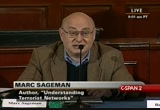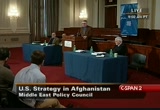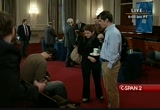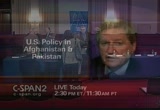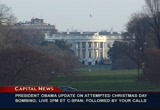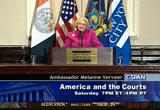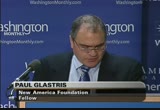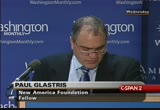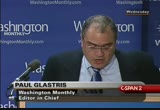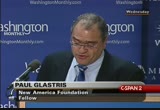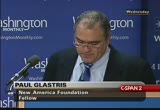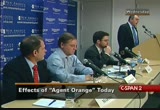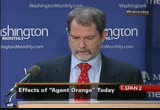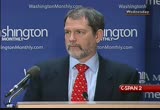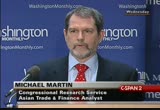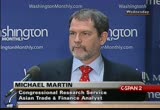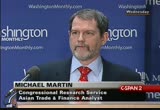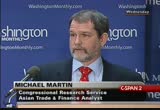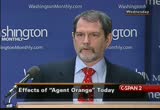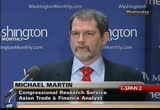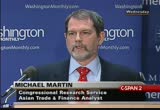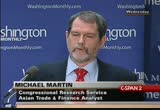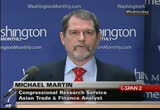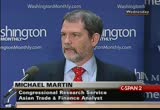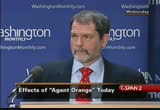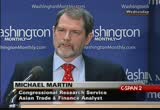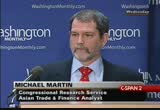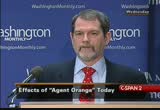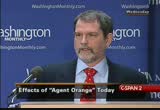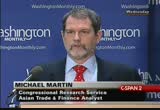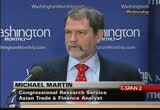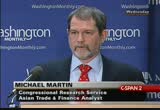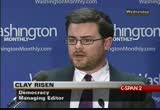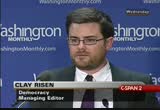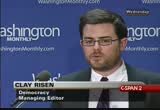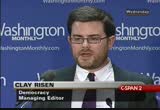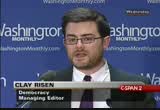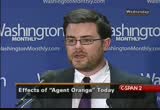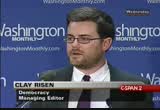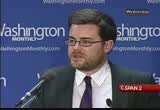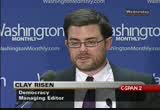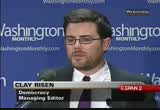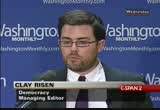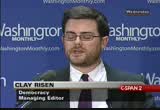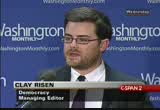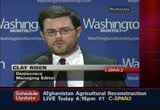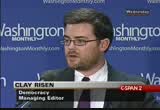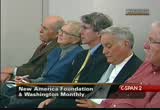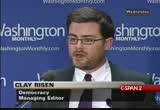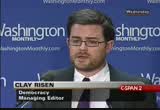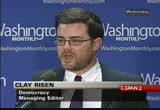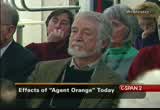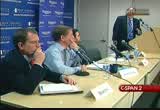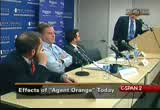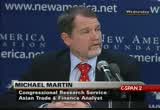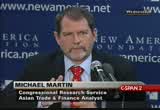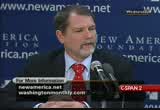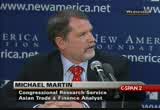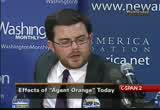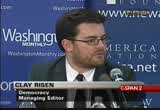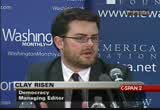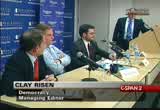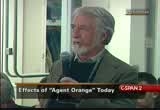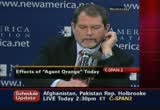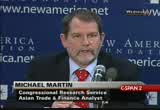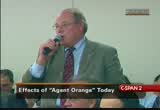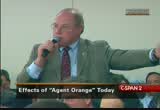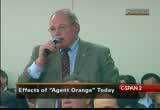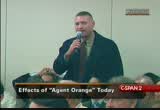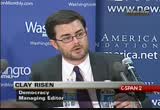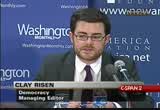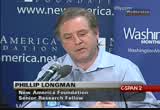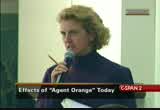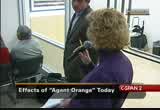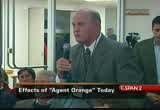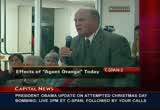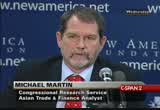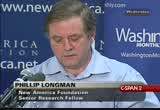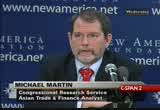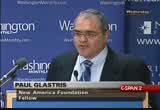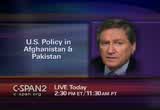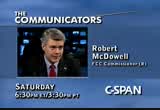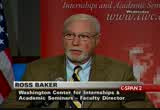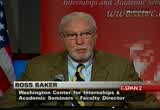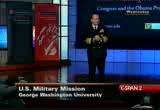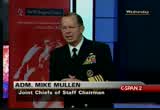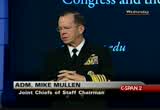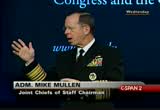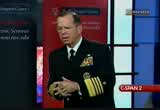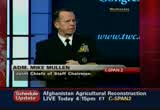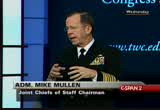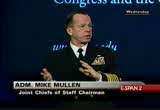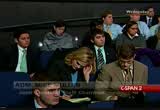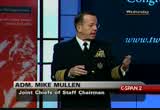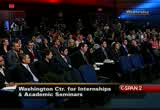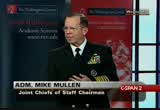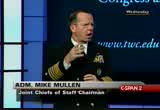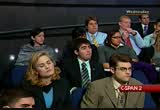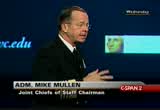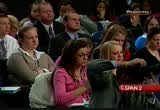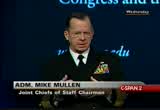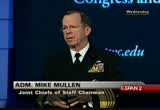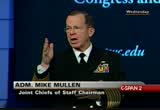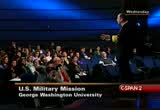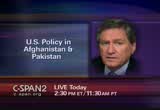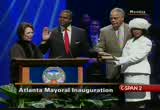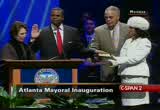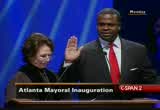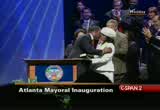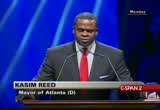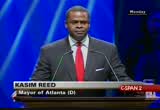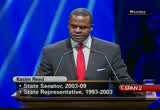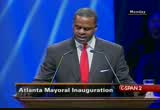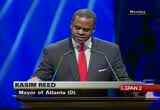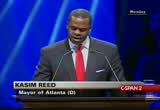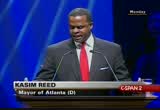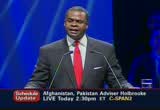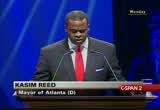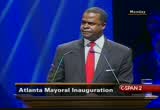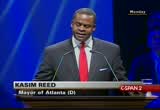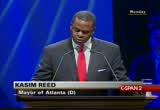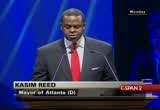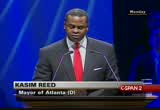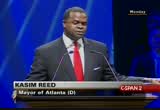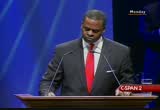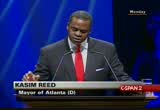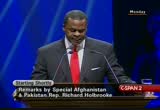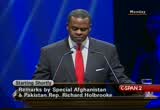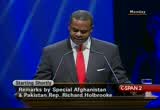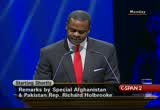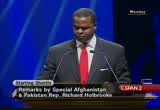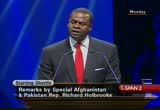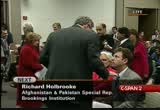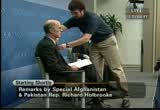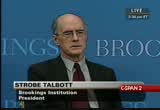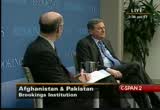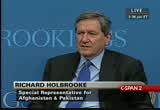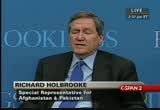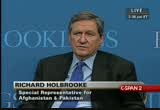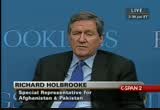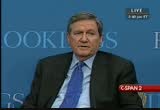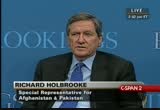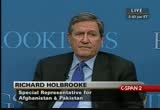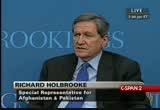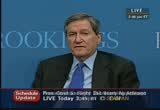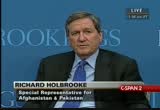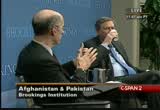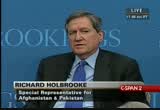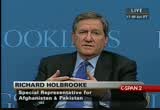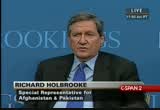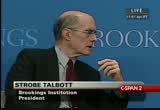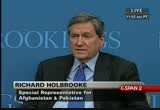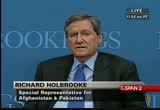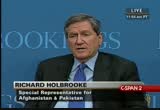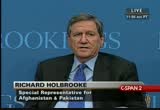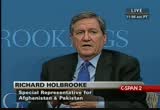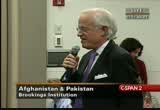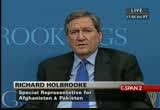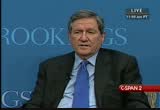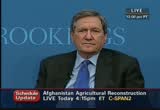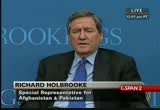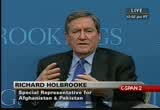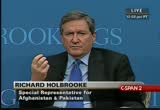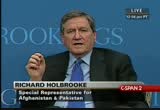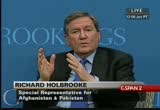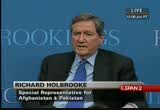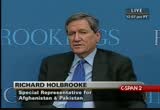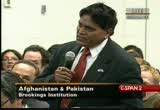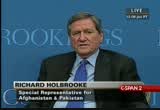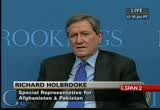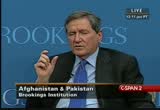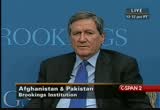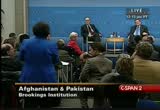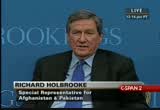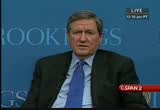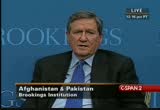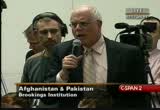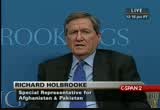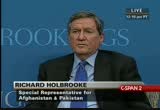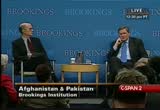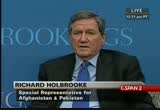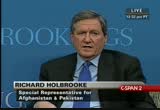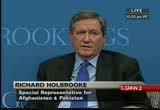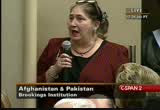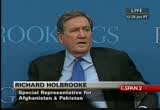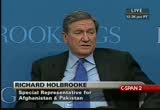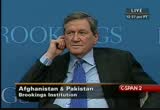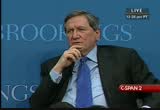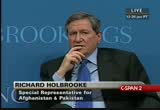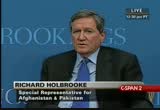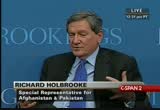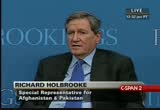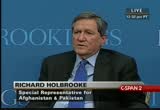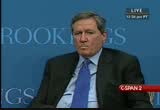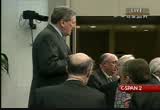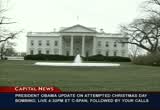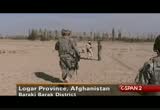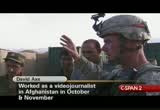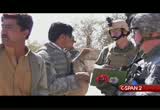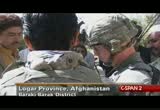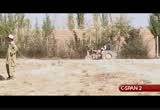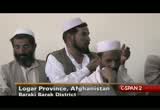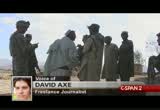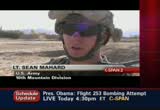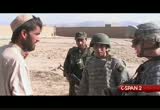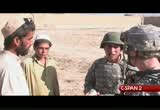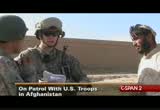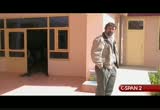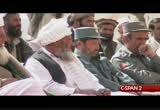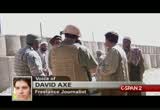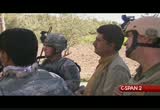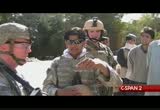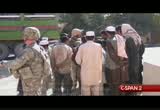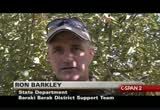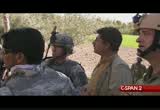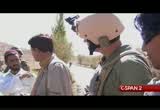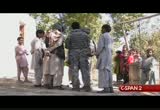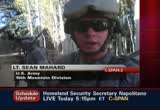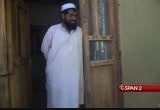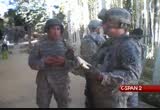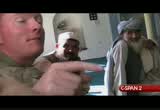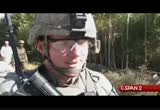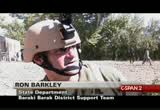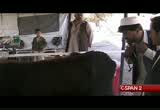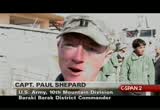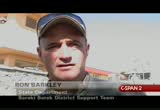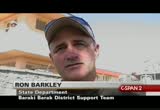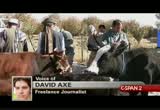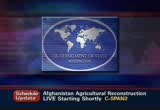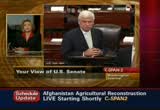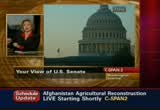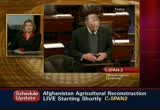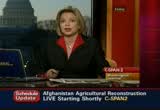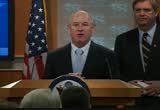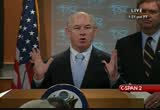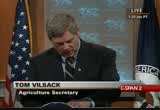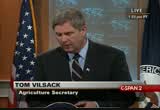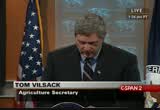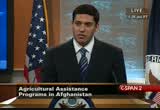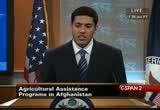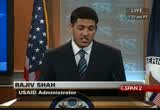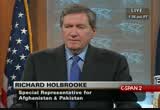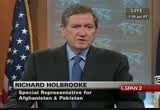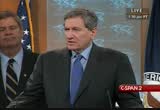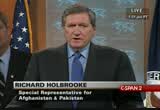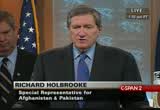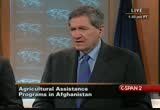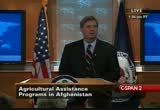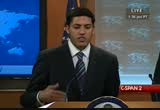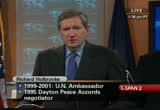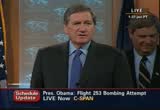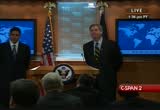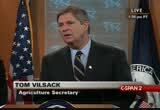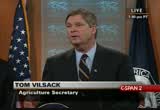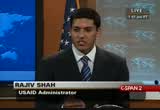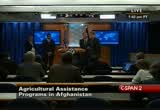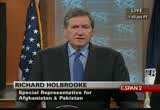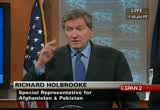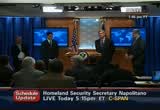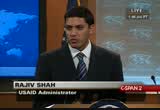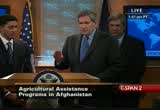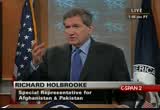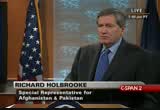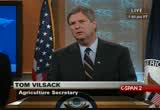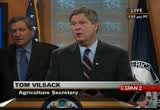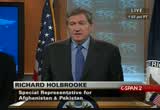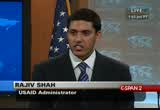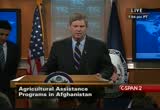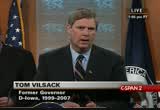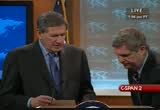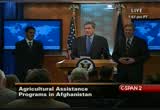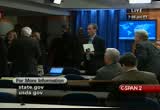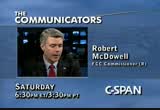tv U.S. Senate CSPAN January 7, 2010 12:00pm-5:00pm EST
12:00 pm
my, you know, the model that may work is what israelis have been doing in terms of air transport. they take young people, usually at universities, physician, lawyer, law students, medical students, at the airport. have them talk to all of the passengers coming in. just talk. and those kids are young, they are 20, they are very curious, and if a story doesn't make sense, they keep on asking questions. until they -- you know, it's the sense of curiosity. if it doesn't make sense. those kids burned out very fast. they usually let go after one year or two. and they never stay for long. they are not professional people like tsa or elsewhere.
12:01 pm
it's really the sense of inquisitiveness. we just have bureaucrats working now in counterterrorism. we don't have the sense of inquisitiveness. all of this putting data in large data set is going to prevent up. i mean prevent the next terrorist attack. this actually was a very sophisticate thed act. the amount of explosive that was sown into the underwear was three pacts of sugar, the equivalent, 80 grams. it's really three ounces. you talk about minute thing that you would not have discovered if you padded down the person. the initiative of his daughter
12:02 pm
should have been followed up. and maybe design a system where the person himself drives the system. so that if something like that is going obvious, you -- on, you are immediately check the database. is he in the united states? if he has a visa, you cancel it. if he wants to come here, that act drives the system to perhaps respond. but right now i don't think the system works. >> thank you. i'm afraid we're out of time. i'd like to thank the panel and thank the audience for coming. let me ask one more time, take a look at our web site www.mepc.org. take a look at our journal and other programs we offer. thank you for coming. [applause] [inaudible conversations]
12:04 pm
>> senators john mccain and joe lieberman say that american drone strike just over the border in pakistan are critical in defeating terrorists in the region. this coming from "the associated press." senator lieberman saying the strikes tonight in a saving. senator mccain say they have not al qaeda and other islamic extremist organizations off-balance. he said the u.s. is working with afghanistan and pakistan to reduce civilian suffering. we will have more about u.s. policy in afghanistan, and the challenges the obama administration faces this afternoon. we will hear from richard holbrooke, u.s. special representative to afghanistan and pakistan on what future policy in the region might look like. he will speak at the brookings institution. that begins live at 2:30 p.m. here on c-span2. the house returns next week to begin the second session of the 111th congress. the senate returns eight days
12:05 pm
later on january 20. right now, democratic leaders of both chambers are negotiating a health care bill with the white house. >> the president will be speaking this afternoon. the white house has said a very comprehensive unclassified report will be released today on the christmas day attempted bombing of the detroit bound airplane. president obama, characters and advisor john brennan and homeland security secretary janet napolitano will discuss the report later today. we will bring you the president, live, at p.m. with your calls
12:06 pm
12:07 pm
vietnam, and that government is now demanding compensation for damages. it's also believed to have caused serious medical conditions and thousands of american soldiers who served in vietnam. the new america foundation, washington monthly mag zine hosted this event. it an hour and a half, beginning now. >> senior editor, senior fellow here at the new america foundation. so on behalf of the "washington monthly" and new america, thanks for coming. we're here today to discuss a special report just released in the current issue of the "washington monthly" called "the agent orange boomerang," which you can read at washingtonmonthly.com. before i start i just want to thank new america, stay the staff of the "washington monthly," and also charles daly of the ford foundation for his support. from 1962 to 1971, the u.s. military sprayed close to 20 million gallons of the
12:08 pm
herbicide agent orange across vietnam to defoliate dense jungle in order to better protect movement of personnel and equipment. from north to south and to destroy any crops. that sprang we now know left behind residue of dioxin of persistent and highly toxic chemical. over the next two decades, american soldiers who served in vietnam were forced to fight another long war. this one to force their own government to recognize the damage dioxin had done to the bodies and to provide health care and other benefits they deserve. washington did so in 1991 when president george h. w. bush signed the agent orange act into law. and in the years since, just as seemingly done, the issue of agent orange is largely disappeared from the news. but in reality, probably agent orange never really went away. in fact, it is now morphing into a new set of problems for our nations leaders. it turns out that dioxin, a long
12:09 pm
acting toxin, is continuing to damage lives in vietnam. not only for those exposed to it during war, but for their children and their grandchildren. the government of estimates that as many as 400,000 vietnamese died early from ailments related to the exposure of dioxin and that half a million children have birth effects because of exposure of the chemicals reaching into the soil and water. until recently the effects of agent orange were not something the vietnamese government talked much about. after normalizing relations with the united states in 1995, hanoi and hanoi's overwhelming goal was to win favorable trade deals with the united states and admission to global bodies like the world trade organization, bringing up unpleasant subjects like agent orange, worked against that strategy. but having attained to these
12:10 pm
goals, high began to press its demands and is demanding compensation for the suffering of its people. that has put the united states in a tough spot. not wanting to set a precedent, but on the other hand, recognizing that vietnam is an increasingly vital military security ally and trading partner. it also raises a much larger issue of all responsibility the u.s. military, or any military has, to clean up the environmental mess as it leaves behind after a war. and that's an issue we're likely to face as we pull out of iraq, and ultimately, from afghanistan. meanwhile, another hidden problem with agent orange is impacting our better stick with each passing year medical researchers are discovering more and more illnesses, many of them major chronical diseases like parkinson's, for which exposure to agent orange turns out to be
12:11 pm
a risk factor. yet hundreds of thousands of vietnam veterans suffering from these conditions have been denied va care for years. as they have waited for the science to prove that the suffering they've been having is indeed service related. so the problem of agent orange which we thought we had put behind us is once again staring us in the face. and in this latest issue of the "washington monthly" would have a special report that looks at these new developments and makes the case that we finally should do something, do what we should have done actually years ago. and that is, offer humanitarian aid to the vietnamese for the suffering of those affected by agent orange. and do right by our veterans and offer va care to all who served, no questions asked. you can agree or disagree with those arguments, but i think there is no doubt, and i think we've documented pretty carefully, that this is an issue that is going to be on the radar screen for the obama administration, for congress, and for the va.
12:12 pm
so to discuss these issues were brought together a panel of writers and experts whom i'm honored to introduce no. doctor michael f. martin is a special, specialist in asian affairs for the congressional research service of the library of congress. dr. martin's professional career has included work in china, japan, hong kong and vietnam. and he has taught at hong kong baptist university, colby college and tufts university. clay risen is managing editor at democracy, a journal of ideas. he is formally on the staff of republican, and has written on history, politics and culture for a variety of publications, including the new york observer, atlantic monthly, smithsonian and now the "washington monthly." phil longman contributor to the "washington monthly" is a senior research fellow at the new america foundation here, and the author with ray boshara of "the
12:13 pm
next progressive era: a blueprint for broad prosperity." also, find book on the va called "best care anywhere." so let me begin by asking to the podium, dr. michael martin. >> thank you very much for that kind introduction, and bringing up this issue that is proving to be very timely. and perhaps of increasing concern over the days ahead. before i begin with my short, short, brief presentation, the quick disclaimer. the views i reflecting today are my own and my personal views on the issue, they do not necessary reflect the views of the congressional research service or the library of congress. what i'd like to do for the time that i have is to focus on this issue, more from the vietnamese perspective, or at least my
12:14 pm
understanding of the vietnamese perspective, then looking at the u.s. aspects of it. and with that in mind, what i would first like to do is talk about the three particular outlets of the issue. little bit of background on each of those issues. and then talk a bit about from the vietnamese perspective, how this impacts on u.s. vietnam relations. in terms of those three main key issues, i sort of boil it down into environmental remediation if that is to say, dealing with environmental damage that's been caused by the dioxin. second, the health care issues that are associated with people who have been exposed to dioxin and agent orange. and third, an area that sometimes doesn't get enough consideration, which is a continuation of scientific research about the effects of dioxin and agent orange on people. so let me go through these as quickly as i can. but to try to be concise.
12:15 pm
in terms of environmental remediation issue, hatfield consultants is a canadian company has done a number of studies in vietnam to try to determine where in deeded dioxin and agent orange remains in the environment. and basically, they came up with this concept of hot spots, places where the concentration levels are high. generally due to basically spillage and lost during the movement of agent orange, not areas that were sprayed. by and large, they found that the residuals in sprayed areas, even heavily sprayed areas, are not at the international threshold for posting extended danger. know whether or not those days are comprehensive is a whole issue, but as a result, let's focus on these hotspots. there appears to be somewhere in the 20 to 30 hotspots around the country. but three of them have become
12:16 pm
the prominent focus of the efforts to date on this issue. and oddly enough, they are all free around used to be u.s. military bases. excuse my being in his pronunciation, i've been there but i'm very not good at any. polecat is one of them, and the major one is at the nay. which was the primary military base for u.s. operations during the war. if you look at the bma's perspective, most recent figure that i found they estimate it will cost somewhere $60 million to clean up the airport. there is a joint effort going on between the united states and vietnamese government. today, in terms of resources that a been dedicated by the nice days on this effort, roughly $4 million. just recently they announced contracting up 1.7 million, 1.69
12:17 pm
to be more precise, for the construction of the secured landfill. now i've been to the facility and what has been done to date is effectively a containment effort. a way of trying to limit public access to contaminated soil, water, lakes, ponds, as well as the creation of an catchment area to catch any water that would be contaminated with dioxin so that it does not spread further in the ecosystem. but this is now created a new situation which is having contained a problem, they are moving to clean up. and they are the least, the last i heard is the question was do you just try to clean it up right away, or basically move contaminated soil out of the area and find a way of cleaning it up later? it appears that they have chosen to do the latter. that is, move into an area and a secured landfill and find a way of trying to remove the dioxin
12:18 pm
from the environment. one of the ways of doing that is an experimental bioremediation technology, which is being utilized, which is hopefully of greater use than just this one application, but could be used in other situations around the world. there have been some criticism of the inane government about the speed at which this cleanup program has proceeded. however, my impressions have been that by and large, the relationship between the u.s. entities and the vietnamese entities that are involved in this, contain and clean up activity, has been generally fairly good. been fairly successful. moving van onto the health care issue, then things start getting a little more problematic. it part of the big issue is the actual scope or skill of the issue is really unknown. if you look at the mini figures, we've already heard the figure of 400,000 deaths attributable to exposure to agent orange and
12:19 pm
dioxin, that the enemies themselves come up to a figure of four port 8 million people in vietnam that have health or medical problems associated with exposure to the dioxin and agent orange. and one recent media report put the 10 year estimate cost of dealing with the health effects of agent orange dioxin at $30 billion. to give you some perspective on the scope of this, the latest figure i can see of the vietnamese government in terms of their annual outlay of the issue is 44 million. so we're a few scales off from each other. 30 billion on one side, 44 million on the other. u.s. assistance dealing with the health care aspects of agent orange in vietnam, today, 2 million. which is again, give you an idea where moving orders of magnitude from one into the other. part of the problem behind it is
12:20 pm
issue is identifying the victims or people associated with the exposure of agent orange dioxin. as you can probably imagine, at the time of war, it wasn't exactly clear who was where exactly when. particularly given the nature of the war far that was going on and did not. since the war, a number of people have moved and relocated around vietnam. so the actual physical location at this time may not be associated with exposure. the result is, it isn't clear exactly who is exposed to agent juan and dioxin when they were in vietnam. second, even if they were exposed, it is a 100% clear they themselves have been affected by it, and one of the issues of social with that is the cost of trying to do such a study. agent orange is not water soluble. it is fat-soluble. i'm not a scientist. but what it means is you have to do a fat tissue tested, and the last estimate i saw was $2000
12:21 pm
per test. so needless to say, given that the -- having tested on everybody in vietnam would be a prohibitively expensive costs, particularly given the alternative would be to utilize it to take care of people who they believe are affected by agent orange. another outlet, and this is again my personal view, is there is a little bit of conflation in vietnam between victims of agent orange as it's often put, and people with certain medical conditions. there's almost a presumption that if you have a certain type of medical condition, it is a trivial to exposure to agent orange. case, would be an example of one. again recognizes spina bifida as a birth defect be associate with agent orange. it's often presume that it's related to agent orange exposure, even though it may not be. moving on then, quickly, the area of scientific research.
12:22 pm
if you look back over the time period since the war, there was an effort for joint research between the united states government and the vietnamese government to try to identify the extent of this problem. it flattered that you did not really go as well as hoped. there was a period where they pulled away from it that seemed to be reemerging as an area of willingness to do research. however, as i sort of indicated earlier, the ability to do such research is difficult to identify people. for depakote if you want control groups, people who were not exposed in people who were exposed to it inside the non-it's very difficult to differentiate those two populations. some of those people have moved around and people weren't exactly where that they were being sprayed with the agent orange and dioxin. second as i indicated, the cost of actually doing the study, tissue sampling, to determine whether not someone has a high level of dioxin in their system. another problem, third, when you
12:23 pm
get -- even if you have determined the individual has to oxen in the system it doesn't mean the health conditions or problems that they have are associated with the dioxin that cynicism. there may be other contributing factors. there are a number of other new initiatives going on in the not. my understanding is a census is being done under the auspices of the ministry of natural resources and the environ. as was the ministry of health, to try to identify it with anybody the mini these population individuals who may have been adversely affected by dioxin. in addition, there was a recent japanese -- joint japanese, vietnamese there that looked at 47000 veterans inside vietnam, beaten these nationals, trying to differentiate between exposed and not exposed, to see whether or not there is indeed a higher incident of certain health problems among those exposed to agent orange and dioxin. that study confirmed that, yes, there is a differentiation.
12:24 pm
let me finish them by talking a bit about the impact on the u.s. and in his relation. as you've already heard, for a bit of time that he and his government seem to accept that this issue can remain on the back burner. it wasn't that it wasn't raised, but they were willing to let it be set aside so that other priorities for the vietnamese government could move forward. such as the return of diplomatic recognition to vietnam. membership of the world trade organization, normal trade relations. though seem to take more of a priority than trying to press this issue. however, on the other side, the u.s. i can do issues associated with the war that also took precedent over the agent orange issue, which is the mia dashed pow issue. not much to go on until nice to his government felt that was adequately addressed. we have apparently moved into a period where they do see that is
12:25 pm
adequately addressed. as these issues felt aside as normal, wto, all of these issues have decided basically allowed agent orange and the associated concerns to perk higher up on the priority list in vietnam. and they were willing to bring the issue forward more. that is not to say that there aren't other issues that threaten -- i should say threaten, but couldn't push agent orange off the front burner and into the back burner again. for example, vietnam this past year of life or membership in the generalized system of preference of trade preference, policy of the united states government. that application is still any. no decision has come from either the bush administration or the obama administration. so pushing on agent orange may possibly, in the eyes of the emmys, have adverse affects on their gsd avocation. so they may be willing to step back for a while on that.
12:26 pm
another issue coming forward, is a trans-pacific partnership and initiative to form a free trade association in asia, united states just recently announced that they are going to enter into formal negotiations to join what we call the ttp. vietnam has also expressed an interest in joining tt he. so you have a trade off on ttp negotiations versus agent orange. in the future. my next point in some ways contradict myself, and that i keep talking about the vietnamese government from their perspective. one of the things i came away with in my research in vietnam is that there is no unified vietnamese government respective on this. different ministries, different agencies have a different take on the issue. theirs committee 33 that is officially been given the authority to deal with this issue. they are trying to coordinate this issue.
12:27 pm
and have done from what i see fairly effective job on that. however, different ministries, different agencies, have -- may have different perspectives on the issue. ministry of health may be primary concern about the health effects. and trying to adequate address the health effects. what's called the ministry of labor, sometimes wore inflows or just invalids and, let's see, invalids and social affairs also deals with the agent orange issue. they do with providing benefits that they are concerned about it. on the other hand, the site at the transit airport is under the ministry of defense of the record they would like to extend the runway. they're interested in making that available. so their priority may be in getting the contaminants out of the area. they can extend the runway and proceed on that project and let someone else worry about the cleanup later. so you start seeing the beginning of tensions within the vietnamese government and how to
12:28 pm
do with it that even under industries that you may not think of, the ministry of industry and trade, for example. some other things that vietnam is best known around the world for exporting. say, carp, catfish, are bottom feeding fish, dioxin tends to settle to the bottom of the aquatic environment. so the catfish may be a primary source of the getting into the food chain in vietnam, or around the world. so needless to say, the ministry would like to sort of downplay problems associated with dioxin possibly being in the fish, ducks, geese, being types of exports that may have dioxin. similarly, the ministry of natural resources and the environment may have mixed feelings about the issue. they want cleanup, but on the
12:29 pm
other hand they don't want to imply that agricultural products, out of vietnam are inherently contaminated. however, having no pointed out that there are some tensions within the vietnamese government, there are certain elements that i found consistently reflected in different agencies in vietnam on the issue. first was time and time again, there was a vietnamese talk about the contrast between how u.s. vietnam war veterans were being treated in u.s. policy. and u.s. governments attitude towards the vietnamese war veterans in the vietnamese usw population. i will let others speak about that, it's sort of a perceptioperception of exposure and therefore given the presumption of exposure, medical conditions can be treated and provide benefits due to the exposure. we have not correspondingly treated the vietnamese
12:30 pm
population. second, there's some confusion from the apparent priorities of u.s. funding. for example, as i mapped out artist is about $6 million that have been provided by the united states government to deal direct with the agent orange issue at the transit airport. that contrast a bit sharper with $320 million that been provided to vietnam under what's called the pet t.a.r.p. program. so whereas it deals with hiv-aids, it is $323 million through this fiscal year. agent orange which perhaps is a more service issue as received to, or six if you want to look at it. . . whole part. at this time, my sense is the vietnamese government are more concerned about not addressing blame or who is responsible or legal obligations. they really want to work on solving their problems, dealing with the issues at hand.
12:31 pm
the last point i would also make which is just to throw it out on several occasions from the vietnamese perspective by her statements that say we cannot fully normalize relations with the united states until the agent orange issue has been addressed. so from their perspective we have not normalized relationships yet. it is a process we are part with their. i am going a little bit long. my apologies. a couple of quick things. u.s. response to date as i indicated there's been three -- $6 million appropriated by congress specifically to deal with this issue, 3 million in is there more to come? that's a good question. we shall see. the house foreign affairs committee has held two hearings on the issue. are there more to come? again, time will tell. the obama administration has been actually trying to get dispersement of funds that have been appropriated. they have personnel in place dedicated to this project and they continue to work
12:32 pm
through the joint advisory committee to facilitate government to government communications. last, just to reiterate, earlier i mentioned gsp and tpp as issues that may impact on how much there's willingness to work on agent orange issue. i would add two more. one recently, there is increasing concern about the human rights situation in vietnam, particularly treatment of the media and second the issue of workers rights continues to be ongoing issue between the united states and vietnamese government. so, did i provide you any answers? no. but i hope i provided you useful information. i will hand the podium over to the next speakers and i am ready and willing to answer questions later. thank you. [applause] okay. appreciate paul including me
12:33 pm
in this esteemed panel and new america hosting us. the focus of the article that i wrote for the package was really, or the purpose of it was to take a step back and say, what is the historical, legal, international context within which questions about u.s. obligations or the possibilities of u.s. action to remediate agent orange take place? are there, bases for obligation, either, legal, moral or political? or even just, possible leverages, points of leverage where the u.s. could be brought to address these questions? and, the answer unfortunately is no, there aren't very many but in the article i tried to explain a little bit about how if you were nevertheless to, as a policymaker try to conduct a way to push the u.s. toward greater responsibility or
12:34 pm
recognition of its need to act, how would you do that? so, the first thing to keep in mind, when you talk about the environmental consequences of war, there are really two kind of broad categories. one is, and they're somewhat artificial but the first one is, the consequences of actual war fighting. so, you explode a bomb. you shoot gun. you lay out a landmine, these sorts of things. there are very few, and, there are very few points of international law or really efforts to control this, this aspect of military activity, and in very little interest on the part of the global community to do something. the reason for it is obvious. if you are a country that has a military and you want to make sure your military is effective, you don't want to be creating a corpus of international law that
12:35 pm
restricts unnecessarily your ability to act. so there has been activity on certain things sort of like on the edges, banning weather modification or restricting deployment of landmines. landmines are actually a horrible thing for the environment. animals step on them. they leech chemicals. and they're often not mapped. chemical weapons, the control of chem weapons and eradication of chemicals weapons in that regard. the core idea that we should try to reduce the impact of conventional warfare on the environment is something that ultimately hinges on a paradox, all military activity, all war fighting is inherently bad for the environment. so given that, most countries, i would, i wouldn't hesitate to say that pretty much every country wants to stay away from any of those kinds of limitations. the only place where you do see some action is in sort of victor's justice. the best example being after the iraq, the first gulf war
12:36 pm
in which iraq was required to, or actually, some of the money iraq was required to give to the u.n. was funneled into fund that paid for cleaning up of spilled, of oil spills, of the environmental damage caused by iraq's scorched earth campaign at the end of, toward the end of that conflict. the other category of activity is sort of everything else but is, it is positioning of military troops and, assistant personnel, of basing of, movement of goods and troops and material around the world, testing weapons, and everything, developing weapons, everything that goes into getting up to the point of war fighting. this is obviously an enormous category. also one that, every military undertakes, even if they never actually go to war.
12:37 pm
and yet this is also one where the efforts to control it have been surprisingly limited at the international level. again for the same reason. you don't if you are a country with a military, you don't want to agree to unnecessary limitations on that, on that activity. it is also a question where very few countries actually really have to deal with it in an international context because most countries don't have bases outside of their own territory. the united states does. britain, france. a few others. the soviet union did and, russia now did and withdrew from those in the 1990s. but it really becomes a question of, a question for the larger powers in the world. so inherently you're going to the have a, already a stacked deck against anyone who is trying to create equitable international law
12:38 pm
around basing issues. there is also the issue of the dominance of bilateral law in this regard. every country that agrees to host military forces has signed some sort of status of forces agreement with the, with the country whose military is coming on to their territory. unless of course they have been conquered. let's say majority of countries are in this category. the so the philippines up until 1991 had, was home to subic bay naval base and clark air force base or clark airfield. enormous facilities. when the u.s. pulled out it was discovered that we had, over the course of, you know, several decades, laid enormous environmental waste to the countryside. there was never a working sewer system at the bases and so, the result was, just, decades and decades of human and animal waste accumulating in the ground
12:39 pm
and in the water around there. however, for what it's worth, the philippines, the government, after world war ii had sign ad status of forces agreement that said, it would take care of any of the side-effects of u.s. action. the u.s. also said look, what we're pulling out in the 1990s we're cognizant of these problems, these environmental problems, we can't really hold ourselves responsible for actions that were begun at a time when no one in the world really considered the environmental consequences of this kind of activity. so we, we're not going to put ourselves in a position where we're suddenly responsible for actions taken under a different sort of paradigm or different mindset. ultimately it comes down to a question of cost. this is, if you were to require the united states or any country really to clean up after its military activity overseas, there
12:40 pm
really would be no end to what can be required of them. the u.s. recently paid 100 million, it was 10 years ago, paid about 100 million to canada to clean up two relatively minor facilities that we had up in northern part of that country, and, that's an instance where, you know, the impacts and the amount of damage was relatively minor. and, we don't want to get into a situation where we're having to, where we, the u.s. military, not obviously myself, where we, where the military is having to check itself and spend inordinant amount of time keeping its activities limited or, somehow aboveboard environmentally and therefore, possibly not doing as much as it can to fulfill its mission. that's, its perspective and that is the perspective of
12:41 pm
the people in the government i spoke with for the article. now, all that being said, so you have these two categories around which there really is no corpus of international law and no motivation or no momentum toward the development of a corpus of international law. there are, there is, yet another category where there has been some movement and that is, on the political motivations for cleanup and there's one great example and one that i think, that i discuss at length in the article and is something that could provide a framework for thinking about vis vietnam and that is, japanese cleanup of chemical weapons left behind by the imperial army in northwest, or northeast china. so when the military forces of japan were withdrawing very hastily at the end of the war, they left behind some 700,000 unexploded munitions, bombs, shells,
12:42 pm
what have of all sorts. they had a whole range of chemical agents and over time, most of them were buried. some were just left in bogs and river sides. not really near cities necessarily but over time, as population grew and people moved into these areas, farmers started turning up, unexploded shells. construction crews would hit a shell and it would go off or it would leak. over time or over the last, say 60 years some, you know, hundreds of thousands of people have been affected and many of them have sustained life-impacting injuries or, have died because of this. so, china has long pressed for japan to do something about it. now until relatively recently japan has had no obligation to do anything. in the 1990s it signed the chemical weapons convention which required it not only, which required signatories not only to get rid of their
12:43 pm
own chemical weapons, but also if they left chemical weapons on foreign soil to remediate that impact. so again, there were very few countries that actually fell under that category but one of them was japan. that being said, japan for a while did try to resist doing anything under this. they said we don't really have an obligation. they sort of, you know, it is politically very difficult for us to do anything. far right in japan has a lot power and they don't want to take responsibility for anything we did in china. but one thing changed over the course of, the late '80s moving into the '90s and up until today. that is the relationship between the two countries has changed. suddenly japan is not as powerful as it used to be and china is many much more powerful economically and politically. the two are each other's perhaps most important neighbor and so, japan now sees political need and economic need to make nice
12:44 pm
with china. now there are certain things that japan will probably take a long time to do in this regard. they will probably never apologize for invading china, for example. but, there are certain things that, the japanese decided in 10's we can do. we left all the chemical weapons behind, we can address that. we obviously owe china something for that. and here's an easy way, a politically palatable way to address the question and therefore improve our relationship with china. so japan did really not a 180, call it like a 130 and began to, move toward an agreement, a joint effort with china since 1997, japan has piled millions and millions of dollars into this effort. things haven't gone as swimmingly as it was predicted. it is a very difficult thing to do.
12:45 pm
this is, there's never been an effort on this scale before. the chinese government is somewhat difficult to deal with when moving large, inexplicably technical machinery into their country. and, there's also been corruption on the japanese side. nevertheless, the political will behind this effort has been has been quite striking. but the point is, that the political will came about not because there was a moral horrible mitigation or because the legal groundwork changed but simply because the political environment changed. and, there's also an interesting parallel, not nearly of the same size regarding the u.s.. having said all this about the u.s. never wanting to take account of its environmental transgressions overseas, there's an interesting comparison to the way that we've addressed this question with regards to canada as i mentioned and,
12:46 pm
panama. now in panama we had bases in the canal zone for, you know, almost 100 years and we, during world war ii, used some of those base, testing areas, mostly islands off the coast, to test chemical weapons. the idea being that the japanese might use chemical weapons against us in the south pacific or we might have to use them against the japanese. there was really no understanding what that would be like in a tropical environment. so the u.s., said, well we have this, we have control over these islands. we'll test some weapons there they tested them. not all of them went off. there are, to this day, unaccounted for number of chemical weapons sitting on a few islands off the coast of panama. the u.s. has offered, in addition to the kind of bare minimum cleanup it did after it pulled out of the canal zone in 1999, we've offered a minor sum of money, i think a couple million
12:47 pm
dollars, to help them cleanup these facilities but our position has been, look, you know, what are you really asking for? i want to go in and cleanup an unpopulated tropical island. you're going to destroy all the flora and fauna to get to the weapons. you will clean them up and result will with be same, actually will be worse as, if you, as opposed just leaving them alone. so our response has been sort of, just deal with it. and here's some hush-money. compare that with our efforts, our cleanup efforts in canada. as i mentioned, a couple of relatively minor, small facilities in canada that we pulled out of after the end of the cold war. canada said, we have, yes we know we promised to clean this up but you guys owe us $100 million to take care of this. we're not going to do this on our own. besides, we're our biggest trading partner, we're your next door neighbor, come on.
12:48 pm
surprisingly realpolitik came to the floor and in 1998 after a few years of saying no, we don't do that kind of thing the u.s. completely turned itself around and said, this is according to the john hamry, the deputy secretary of defense at the time. there is no other country with the same combination of geography and his historical significance to the u.s. with national security. he said we're going to take care of this he said this was a special case not duplicated anywhere else in the world. what is important to note is two things. first of all because we have this relationship with canada, we decided to go against what is a pretty clearly stated policy and to go above and beyond the status of forces agreement we had with canada and take care of the problem. at the same time, what was very important was the ability for the u.s. to say, here's, this is a very special case. we're not going to do this for anyone else.
12:49 pm
and so, that becomes kind of, a very vague but, i think useful framework for thinking about how do we, how could the u.s. come around to doing something in vietnam? what would be the requirements for the u.s. to do something? first of all, there's, never going to be a case where the united states recognizes the moral obligation. it's proven time after time again that is not a criteria. the u.s. has no legal obligation either bilaterally or under international law to do anything. but, and the u.s. is going to pay, is going to charge a very high price or there will be a very high threshold for the u.s. to do something because of changing political economic relations. however, if there is a way to frame the assistance, that is, limit it, makes it a special case where the u.s. can say very clearly, we're doing it for you and we're not going to do it for
12:50 pm
anybody else, i think, if that were possible you would start to see some action. in fact that is what's happening in the case of the very limited cleanup that michael discussed around da nang. the u.s. said, we'll give you this money but, here's the deal. we don't actually, we're not doing it, we're doing it for humanitarian reasons, which really means we're doing it just because we want to make you happy and everything. but the conditions are we don't recognize dioxin is a problem. we don't recognize there is dioxin in the area. we don't even recognize you have need for the money. just in case you do it is a few million dollars and there you go. so that is the same kind of framing. because the united states is able or at least has the gumption to say, this isn't a recognized problem but we'll do it for you anyway we're able to go ahead and do it. as we start to think about or talk about some of these
12:51 pm
larger issues addressing the actual health consequences it would be very useful for policymakers to think about, how can we frame this kind of assistance in a way that is limited, that tends towards an explanation of uniqueness and, allows the united states an out which would prevent it from having to respond to similar claims from other countries down the line? that's an inordinantly high bar. i don't think that there is, you'd have to be very creative, let's say, to come up with a really compelling argument in that regard but i do think that given the history of u.s. actions in this regard and the legal framework that's out there internationally, that is, that is going to be the only way forward. thank you. [applause] >> i should have introduced. that is clay risen of
12:52 pm
democracy journal. i like to introduce phil longman of the new america foundation. >> if you don't mind i will stay seated. i'm a little under the weather. so i'm going to talk about the american veterans experience with agent orange and, before i do, i just want to say, right off that despite my appearance, i'm actually a little too young to have been in the vietnam war. i missed it by a year. so i say that so nobody will confuse me with a draft dodger or with a vietnam veteran who has attitude. if i go into a rage here, i'm doing it on behalf of veterans, not because i am one. there is somewhat complicating factor for me today, i am as paul mentioned the author of this book, "best care anywhere." why va health care is better than yours. i have ownership of that book. it is coming out in a second
12:53 pm
edition. i still stand by what it says which essentially is that the va despite its mixed reputation has undergone a quality revolution that has a lot to teach us about reforming the rest of the health care system. thank you. but the va does have problems and, when it comes to agent orange, many of those problems are very revealed and it is interesting for even those who are not particularly interested in this subject they reveal other contradictions that we carry around with us and how they think about health care, not just military health. it's, by way of a little background, the united states didn't even have a va or anything like it until after world war i. there was no presumption that, if you, had any disability or combat-related problem that we would treat you. civil war, union veterans got pensions if they could prove a war-related disability. but we didn't have va
12:54 pm
hospitals. the va grew after world war ii into what is now the largest integrated health care service provider in the country. it had a checkered history, particularly during the vietnam era but as i say, undergone this great quality revolution in the '90s, to the point that if you talk to most vets today, the thing they're mad about with the va is, they can't get in. because we have this kind of, crazy legacy i don't think we've really thought about much because we just inherited it, that to this day we're not going to treat you as a veteran unless you're indigent or you have some service-related disability that you can prove. you got in the service. there have been times when there were other exceptions but, that's essentially how the va work. now, when it, we got out of
12:55 pm
the vietnam, guys started coming back and they complained about things like acne. we basically said to those folks we'll treat your acne but any other kind of complications you have, we don't recognize as having anything to do with your being in vietnam. it got real ugly for those of you old enough to remember. there was a moment when carter's va secretary, max cleland, was testifying in front of the senate, surrounded by a bunch of vietnam war veterans. cleland, of course a triple paraplegic and they said, threw their medals at them you lost your balls in vietnam too. there was reagan's va secretary got on the "good morning america" show and, used the occasion to call vietnam veterans a bunch of crybabis. there was gigantic lawsuits
12:56 pm
against dow and monsanto, the makers of agent orange. they got settled in a way a lot of veterans feeling gyped. there were conservative think tanks put out all kinds of reports how it was just junk science. that agent orange had anybody to do with anybody's disabilities. that went on for years. until finally in 1991 it looked like we had gotten to a point where we were going to do the right thing. so, passed a law that year that said, if you served in vietnam, and you had one of three conditions that were by then now associated with agent orange, that would be a presumptive service disability and va would treat you. then over the years, of that same act called on the institute of medicine to every year review what science was out there, and as the years went by the oim reports would come back and keep finding more and more
12:57 pm
complications. the big one came in 1999 when they found a strong association with type-2 diabetes, which is one of the most common diseases in american life and more recently we've had new science on parkinson's, early onset parkinson's disease. now, normally, when it comes to public policy you want it based on science. i mean, right? went through the last administration said they ignored science. now we're all pro-science. but in this realm, waiting for science is a real bad thing. it's a real unjust thing. because two reasons. one is, it simply takes time, and enormous amounts of data to make a generation about -- generalization about any association. we've been waiting for an army to die before this definitive science comes in. the other thing is, although
12:58 pm
when you think of a va hospital you might think of wounded warriors coming back from iraq or afghanistan. there are only a small portion of the people being treated in va hospitals. most typical va hospital have 5% of people, recent combat vets. everybody else, middle-aged, aged. their problems are the problems of aging. there are chronic diseases mostly. some of them brought on and exasperated by agent orange. exposure to all other kinds of hazards in vietnam but in any particular individual's case it is impossible to look at them, say, okay, your parkinson's is caused by exposure to agent orange. you know, chronic diseases are always caused by a combination of genetics and environmental factors, behaviorial things. so we are actually, asking people to prove a
12:59 pm
metaphysical point that can't be proved and we now have this gigantic appeals court system that's hearing 40,000 cases of people coming up saying, i got this problem. and i think it has something to do with my service. and, you say it doesn't. and my lawyer says it does and they fight it out every single day. typical case would be, guys 54 years old, finds his hearing is going. thinks, well probably because of all the artillery shells i was around in vietnam. make as claim for a hearing aid, right? they come back, no, i think it was following rock bands in the '60s that's what did it. then a gigantic fight who is responsible for this guy's hearing loss. fortunately there's a better way. what we need to do, as a society is stop trying to condition people's access to health care on the basis of
1:00 pm
they're being qualified or deserving, right? there are access to health care because it's a right of citizenship. certainly a right of military serviceship. now, as i said, most of our vets today are, elderly, or late middle-aged because of the pattern of our wars. most will qualify for medicare anyway. the va has excess capacity. it soon will have a whole lot more excess capacity. as the last the world war ii generation and korea war pass along. . . dicare is about two-thirds.
1:01 pm
so this is a triple winner. open up the va to the vets who can use the medicare entitlement not only that, open >> let them buy into the system. does not only makes clinical sense, an 80 year-old veterans, they're both going to have to learn to take care of each other, but it makes financial sense because every person you get off medicare into the va, you save may be about a third. and patient satisfaction is incredibly high. so that's my case. for what we've got to do, not just about agent orange situation, but getting our veterans ride in general.
1:02 pm
thank you. [applause] >> well, thank you everyone for your remarks. i want to open it up to questions from the audience. at first i just want to ask a few myself. and the first is, that it seems like both in vietnam and in the united states, this is sort of a theme that kind of emerged as we're doing our research and editing the package. what you run into is the limits of science when trying to craft public policy, either foreign policy or domestic health policy. as phil said, one wants to conditioned benefits are based promises of benefits on some
1:03 pm
hard numbers, hard science. in the case of both vietnam and the veterans here, you run into problems with that. this is more of an open-ended question to the staff, but also to michael, is this something that congress, the leadership in congress, or the administration is going to have to deal with? and isn't something that, in your interactions with the vietnamese, they recognize? and i also hear you talk about the point you made, glancingly, that they see a difference in how we treat our veterans. the promises we make and the science we argue, shapes our
1:04 pm
benefits to veterans. and the way science is used in the nine responsibility to vietnam. >> let me start with the most recent one, the last issue, which is the difference in perception between u.s. veterans and how they are treated, versus how the u.s. government for the vietnamese perspective deals with the vietnamese nationals who are exposed to dioxin. and phil makes some good points about the nature of care that's being provided to u.s. veterans. and there's one category, for example, the bluewater vets, for example. under the weight is then interpreted by the va today, veterans who served aboard ship off the coast of vietnam are not eligible for agent orange benefits. because they never put foot on
1:05 pm
soil. and that's how the va has historically interpreted the law that was passed by congress. now, there are bills before congress right now to address the issue that would extend benefits to bluewater beds as well as, as well as the air force, which is sort of interesting because in many cases, the pilots were the ones who are spreading agent orange but they may not be beneficiaries of the agent orange program him because they didn't touch the soil in vietnam if they flew off coast. i don't know the numbers on that category, but it's an interesting concept. having said that, as i was indicating the way it generally work is if you served during a certain time frame in the theater in vietnam and touched the soil, and you have certain medical conditions, that were identified by the institute of medicine as having sufficienttn scientific evidence, that the disease may be attributable to exposure to dioxin, and i hate
1:06 pm
when i have to talk like that but it's without kind of friends out, then benefits may be extended to you under the program. and that's what the size issue over time becomes a problem. inside vietnam, turning to that aspect of it, what my sense of it was that in many cases you're dealing with health practitioners. they have a patient that they have somebody with a problem. they want to treat the problem. they want to treat the issue. and to a certain extent, they are not overly concerned exactly why that person has that medical condition. and so to the medical practitioners that i've met with, the people who provide care in vietnam that i met with really were interested in providing humanitarian assistance. where things can get problematic is when u.s. money is involved, u.s. government money is involved. that money is earmarked to a particular program to be utilized in a particular way for certain types of beneficiaries. and so, you can run into a problem with a have to try to
1:07 pm
attribute the medical condition to a particular cause so that the u.s. funds can flow to those particular patients. now there are ways that have been presented that can address that. for example, you can deal with the presumption of the population around the da nang airport. we will provide medical services to people who live near the airport, regardless of the nature of the cause of the illness. it's just the providing to the area because they are identified as an effect of population. so there are ways is being addressed on both sides. but at times it can be, from the conversations i've had with people, it can be very frustrating. because you have a regular restriction on one side, and the desire to provide assistance on the other. >> lead me ask another question, and that is especially to clay, as we conduct -- as we look to
1:08 pm
the future, america's obvious involving two sizable military endeavors and a lot of little ones around the globe. we are now pulling out of some of the smaller bases in iraq, consolidating in the large would. eventually, those also will be handed over. are we going to see some of the same problems in iraq, and eventually afghanistan, as we saw in vietnam, canada, and so forth? >> beginning the early '90s, the u.s. actually, the military actually did begin to recognize the political dangers of inherent in the pollution and environmental damage that was becoming evident on bases, not only domestically but also abroad as we start to pull down
1:09 pm
our forces in asia and in europe. and so there were congressional hearings. there were -- but more important, there were steps taken within the military to say, okay, going forward were going to try to be a little more careful about these things. if only because that's what is expected of very publicly visible, public institutions, particularly something like the military and when it comes to our activities overseas, we don't want this to become a reason why, you know, the next country forces us to pull out. so that doesn't do a whole lot for bases that have been around for a long time. that damage, a lot of the existing or remaining visas in germany. although, those bases have always been a little better maintained than some of our asian bases. let's say something like diego garcia, there are enormous environmental, enormous amounts of damage there that go back a
1:10 pm
long time. and, despite our new recognition of the need to be better stewards in the '90s, that's just going to be there. so when you apply the question to iraq or afghanistan, i think that, yes, you're going to see, as we withdraw, a better maintained facilities in that regard. that said, the reality is always going to be the same. the forces that we deployed in iraq and afghanistan are not there to be environmental stewards, first and foremost. that's very bluntly what the military says a sickly. we are there to fight a war. and it is someone else's responsibility to take care of that. we would do the best we can, but we're not going to sacrifice or cut corners. and they also still have the same kind of status of forces agreement that, with iraq and with afghanistan, that you saw before. so yes, i think you can expect
1:11 pm
to see better facilities being turned over, or better, say, less polluted area. and i wouldn't be surprised if down the road in iraq raises those questions and says, you know, we've seen the higher level of morbidity in certain areas that we think that's because of xyz that were stored there during the u.s. occupation. so i do think this will continue to be an issue, despite more attention being paid since the '90s. >> i'd like to open up for questions, but first i want to recognize walter isaacson here in the audience. walter, chairman and ceo of the aspen institute. also later on the effort to marshal support behind recognizing the issue of vietnam and agent orange, and a contributor to our special report. so thank you, walter, for being here.
1:12 pm
so questions, gentlemen in the back right here, dan? please, wait until you get to the microphone. state your name and also your affiliation, if any. >> yes, my name is peter carpenter. i'm a vietnam veteran who was heavily exposed to agent orange him and some sops support was diagnosed with chronic leukemia. i was the first such veteran to be granted benefits by the va. as a consequence of knowing both harvey fineberg at the institute of medicine and 10 kayser at the va, i was able to get them to go back and review the data. and i just want to thank the panelists and the organization you're for the work you're doing, because for the last five or six years, this has become sort of a forgotten issue. something that we thought we dealt with. and those of us who served are now getting to the age where we are increasingly vulnerable to the long-term effects of the agent orange exposure which we had. and it's only going to be
1:13 pm
because of the work of people like you that we don't forget about the people who served in. so thank you very much for working. >> thank you. >> thank you for your service. [applause] >> this gentleman right here. >> my name is dave. i'd like to congratulate phil longman in his presentation and solution. i think it's definitely reasonable. i'm not trying to get involved in these issues for about 25 years akai was a legal director for the vietnam veterans of america and the codirector of the national veterans legal services program. and i think your article needs some background and expansion. and 91 act came as result of those litigation we brought against the va him a challenging the va's interpretation of the 1984 agent orange act. they were applying a cause and effects of standard, which is absolutely not by congress. it was overturned by the federal district court of the northern district of california. and the case has been ongoing
1:14 pm
for the last 21 years. basically, you're gentle and that you in your article, once parkinson's is concluded, he's entitled retroactive payments from the first day he applied, not the data regulation. this has never been advertised publicly, as is agent orange outrage has never done publicly. bas under legal obligation to do both. they've done neither. and i would just, again, congratulate you on your analysis. i would correct one thing. congressman montgomerie did everything he could to stop passage of the agent orange act. he fell in line because of the litigation and because of the lobbying efforts of vietnam veterans of america, mostly, at that time. but he fought it tooth and nail. that was the only correction i would add to your article. >> thank you for that.
1:15 pm
>> there's a gentleman right here. >> yes. i have a question for mr. martin. $2000 for dioxin is that the real barrier, or whatever, a 2-dollar task and it turns out that people who thought they had and other people, what's the political implication of that? >> as i indicated in my statement, the 2000-dollar figure was one that was cited to me by the vietnamese authorities. i do know that there are efforts afoot, and the charles bailey and ford foundation are part of that to make available to the vietnamese government, test facilities that would lower the cost significantly. so that we can see another cooperative effort that's going on to try to address the issue. now speculating about what would
1:16 pm
happen if any particular case you would find out that the tissue level is below what would be sufficient to indicate evidence that a particular illness, melody, birth affect our whatnot is a tribute to agent orange is kind of a speculative type question that's difficult to enter. and in some ways, the question may not be whether or not on a case-by-case basis you can demonstrate that the illness is a tradable to exposure to agent orange. in some ways, as we are discussing in the case of the u.s. veteran, and to a certain extent in the vietnamese perspective about the people in vietnam have been exposed, the issue may be more about trying to address the health problems of the population at this time. >> in the back, right here. >> david adelson didn't make
1:17 pm
clear his role, but helped lead to the 91 act. david is correct that senator montgomerie didn't try to stop, but it was ted who stood in front of the train and lead the compensation, and they try to intimidate ted come and take it as a teenager. it survived the holocaust. so there wasn't much that the gentleman from mississippi could do to get wise to scare him. and for that reason, vda made him the legislator of the year and 91. but i do want to correct something. the perception is, and it creeps into the talk, that american veterans, in fact, the problems have been addressed, of american veterans and families. and particularly the families of birth defects, the biggest
1:18 pm
concern right now of vietnam veterans is not our kids. it's the grandkids. it's not a week that goes by that we don't have a young woman called the office and talk about her on amylase and her child that wanted to know, is it due to exposure in vietnam. the institute of medicine process that we have in place with the biannual review is a passive process. so they can only review original science done by somebody else. and currently, there is not a single scientific study of agent orange for veterans funded by nih, by cdc, by arcs, by va, or by d.o.d. so if you don't have science, to review, you're not going to make progress.
1:19 pm
95 percent of the articles reviewed in 200 2006 and 2008 be institute of medicine were done overseas by the norwegian countries, or other countries in europe or the '40s. so the real question is, not just justice for the vietnamese, although we certainly would like to see that, but it's also justice for american families that are still suffering. and so the real key is not just raising awareness in agent orange is still a problem having to do with vietnam, but that agent orange is still a significant problem having to do with american veterans, and their children and grandchildren. thank you. and thank you all for your efforts. [applause] >> the gentleman in the far back there. >> i am from victims and military families for progress. i want to thank you for all your good work on this issue. and you mentioned earlier, max
1:20 pm
cleland is va director in the late '70s and mentioned things started to change in the '90s that and i think a lot of that due to jesse brown, who was clinton's, the mostly clinton's administration, va secretary. and he also talked about the history, it's only been 20 years since the cap level agency. and today, that's very encouraged by the selection retired general eric should seki to be va secretary. there couldn't have been a better. also vietnam veteran. i think it's really significant, for example, when president obama announced his new policy in afghanistan that he was included in the speech at west point. and i guess, my question is, just for feedback, how incurs you are in general for the future and this administration, paying attention to the issue of? >> thank you.
1:21 pm
more questions? this lady right here, please. the microphone is coming. >> my name is alice day. i'm a film maker. in 2008, we finished a film on the documentary film and the environmental consequences of war. we certainly looked at the vietnam situation. but right now, i'd like to think about the applications of this for what's going on now and in the future. you touched on this briefly, that we were interested in depleted uranium. we wanted to have something on that in the film. and we were told by people we talked with that there was absolutely no empirical evidence available to put case for looking at this into the film. but in terms of the science, we gathered that the tests for this
1:22 pm
were not really being conducted in a way that would give us -- size a chance to say something about this. and i think is from a point of view, the future, in preventing some of these things that this needs to be considered. >> so i think clay probably could best address that. >> sure. yes, depleted uranium is an issue that comes up a lot of. is also an incredibly popular munition, or element in munitions mostly tanks and tank shells and artillery. so there's a decided interest against pursuing that very tough question. the issue is that there's a lot of incidental information, a lot of rises in -- increases in morbidity and disease rates
1:23 pm
where it was use, a lot of suspicion. but not a lot, as you said, science. and there are some studies that show no connection. but to most people, even those who are skeptical of the connection, will say, you become when they're being honest, the jury is still out. and so we could see in the future, i could see someday down the line they're becoming a body of evidence that shows a connection. in which case this will become an incredibly important issue, because not only did we use, did the united states use depleted uranium in the first gulf war, that we and other nato countries used it extensively in balkans and we use it now and our conflicts in iraq and afghanistan. it simply, let's say, a question that, a question for the future.
1:24 pm
and i hope that 20 or so now we are not having a very similar panel but focusing on du. it could be a case of. >> i think i may not have answered one of the gentleman's questions, and that it was probably best for phil. the obama administration's appointment to the va suggested, change in policy on these issues. >> well, i think it's a mixed picture, one good thing they did early on is open up the eligibility of little bit more to people had previously been promised benefits and had them taken away under the bush administration. the priorities seven. but they're still an awful lot of people who have served honorably and the military who cannot get in. or we'll have to go through an incredible process work i think
1:25 pm
the veterans health administration, you know, kind of took a licking but kept on ticking under the bush years. towards the end they were doing every thing they could to sort of reinvented the va of 1979 by pulling power back into washington and taking it away from people in the field. i think there's signs that the obama administration gets that, but they also need desperately to get their vaunted information technology to work on claims processing. is that something that's just totally broken, and stays broken. so you know, there was a big fire in saint louis in 1973 just destroyed a lot of service records. so there's a lot of folks, there's a whole industry there goes registry to help people establish that they were actually in vietnam or even in the military. and the handoff from the
1:26 pm
military to the va has been a problem, to. they are getting better at integrating their records, but they are still not there. i think, you, the threshold for what people had arise as mental illness changes from generation to generation. i don't think the va is entirely at fault, but one of the things that is confronted with is just record numbers of recent events coming back and wanting and needing mental health services. and vicious again, they are hiring every psychiatrist they can find, that there still -- and traumatic head injury also. it's partly like there's not the science there, know what to do about it that much. so there's deficits, but in the last budget it raises the va by
1:27 pm
8%, which is pretty good. >> again, quick fire just sort of ask maybe three questions, all at once and will try to get the panel to respond in kind that there was a young lady right here we could start with, and please keep your questions breathe and will try to get as many as we can. >> thank you very much. i am married ellen. i am a very proud member of the dialogue wrote the other also with national organization on disability. be brief. one thing that has not come up today has been, and let me just back for a second. i had the opportunity to work on a paper funded by the ford foundation on agent orange issues and its impact on u.s.-vietnam veterans, and received quite a bit of assistance from david atul stone and rick wightman, who just stepped out. i was floored by what i researched with the ranch hand
1:28 pm
studies and the cdc studies, and the squashing, if you will. it's a hard word, harsh word to say, but the squashing of the science. the challenges that were placed on the methodologies. curious about comments from the team up there on that. how there have been statements about how that science was done wrong and not just wrong like oops, but purposefully wrong. and how do you think that that might provide another avenue, another vehicle for coming to terms with the situation here, for our veterans and their families, but also as it relates back to the folks and get him? >> another question. >> i'm alan with the vva and chairman of the agent orange committee for the vva. i've got a couple of comments,
1:29 pm
and first, for dr. martin, in the presumptive issues when you say may because by the institute of medicine uses different levels of association. and they don't establish it hit me because or not. they do show the association ane secretary makes his determination if the issue becomes presumptive or not. i just want to point out that. most of the issues are limited or suggested association, or adequate associations or limited no association, but they are not me because. and i want to point out. the other issue i have, just to speak on and maybe the panel could reflect that they have knowledge of this. is the agent orange act of 91. the proof in the pudding is always the implementation of the act that any ads there were some requirements on the va to conduct the nicholas lardy's, collect clinical data.
1:30 pm
and use that clinical data to determine if there's issues with vietnam veterans. as of today, if you go to the va and ask them for how many vietnam veterans who served in vietnam, have parkinson's disease, they cannot break that out. because they only collect data on vietnam era veterans, whether the person within the service and during the vietnam period and they were in germany or somewhere else or in the states and never went to vietnam. so they can't break out that clinical data. so they never complied with that part. the other speakers were going to have to wrap it up it is there a question? >> yes, the question i have, has the panel looked at any other information on the implementation of the agent orange act? >> okay. very quickly. >> let me comment on the category of scientific research.
1:31 pm
i was a micro microchip that microchip that spent addressing the issue of scientific research, comments to. one is if you note in my presentation, i did highlight the need for continuing scientific research as something the vietnamese government sees as necessary. and to a certain extent, you are saying some interest in that in the united states government. and what i think is interesting, is in some ways, the vietnamese population themselves presented an opportunity for doing some of that research that would establish causality or reason to believe causality of links between agent orange and certain medical conditions. so i think there is a potential wedding between the two. of dealing with the population here in the united states and the population in vietnam. is also a third group, and i feel remiss that we did discuss about that, which is vietnamese nationals have relocated inside the united states that often, a group that is missed in this
1:32 pm
issue. a number of them lived in vietnam during the time, and may have been exposed to agent orange and i ask that they are not u.s. veterans of the war, and therefore may not be eligible under that condition. certainly, the vietnamese government would necessary recognize their medical condition because they are not vietnamese nationals. so there's a subpopulation 89 states that may be running into health problems that, as of now, we don't have a program that addresses their needs. >> well, again, on the subject of science, alan oates here knows most of what i know. i know from him. but i think, one of the things just astounds me is that the d.a. does have this wonderful electronic medical record system that, you know, held up around the world. and yet, apparently it lacks a field in the program where you can just enter, served in
1:33 pm
vietnam between 1963 and 1972. right? now, it would take effort to go back and do that, but this is an organization that converted from a pure paper record system, you know, to this integrated digital system. surely, we can put that little record in. you might not be able to do it for every single vietnam veteran, but do it. and big enough to a size that you can make reasonable generalizations from. the va does this in all kinds of other realms. take a drug that killed more americans that died in vietnam, vioxx, right? the va was very early in glomming onto that because they could see these clusters of art that. ask what these people had them, and realize it was vioxx. this seems to me you could do a lot of population health. it's not worry about randomized testing and ethical issues and all the other stuff to.
1:34 pm
you do it fast and you could do cheap trick i don't know why we don't do it. >> the issue of operation ranch hand, michael i don't know, if you are on top of it enough that i know we read your paper and put it together over this, and whether you have any insight into the question. >> i'm not a health care professional. let me stipulate that to begin with. my understanding of doing studies of that sort of basically predicated on the methodologies used there. a lot of statistical techniques are very similar. for those of you who have looked over my report, there were indications that methodology may not have been followed in a very rigorous fashion.
1:35 pm
on earlier studies. having said that, i can't establish that. and to a certain extent, my view is, rather than focusing on studies that were done a number of years ago, the issue as i tried indicator, is more on looking ahead to studies that could be done, that should be done, to try to make determinations with medical conditions. and with that in mind, as i said, i can see three readily identifiable populations in which these days can begin. the population of vietnam, the vietnamese american population that have relocated inside the niceties, and the u.s.-vietnam war veterans. >> just in terms of wrapping up, i think one that we took away from putting this together is, what we have in vietnam now is a situation where a lot of the geostrategic interests are aligned in a sense with our moral interests. that there's a very good
1:36 pm
argument that for u.s. national security interests, we are to do right by and deal with this legacy that we still have, that, like canada, like panama, we have -- vietnam is a country of increasing importance. this is an issue that they care about. we have a moral obligation, even if it's not something we would act on as simply as a moral obligation. i think the great question is how it is vietnam important enough that it could likely spur's to take the very difficult steps i think politically it would take to begin to deal with this issue of humanitarian aid to vietnam. and so i want to thank everyone for coming. i want to thank our panel. i want to thank my partner and in all things, for helping me
1:37 pm
put this together. staff of the "washington monthly," karl and others, and also gain and all the folks here at new america foundation, and all you folks are coming. so thank you very much. [applause] >> this afternoon more about u.s. policy in afghanistan. and the challenges the obama administration currently faces.
1:38 pm
1:39 pm
challenges the country faces, plus his path to a career in the military. this is almost an hour. >> congress and the obama presidency continues with a very distinguished visitor. admiral michael mullen, chairman of the joint chiefs of staff, the principal military advisor to the president of the united states. admiral mullen has had a long and distinguished career. he served in a capacity of great responsibility, the naval academy, yet operational experience with nato. but the thing that actually struck me most about his resume, was the fact that he was the skipper of three u.s. navy warships. and you think to yourself, now, what's the connection between being on the bridge of a three-pointer, cruiser, or a
1:40 pm
destroyer, and being the principal military advisor to the president of the united states? and i think it's this. that if you're on the bridge of a u.s. navy warship, you're a person in whom reposes ultimate responsibility and accountability. if you have a cross eyed steersman who put your ship into another vessel, if you run up on a sandbar, it's all your responsibility, you are held accountable for. and his high level level of accountability and responsibility is the kind of virtue that someone like admiral mullen brings to this incredibly important office. the responsibilities are colossal. i'm sure there are times in which he thought to himself, i'm not sure i signed up for this cruise. and he has been, i think, unique among recent chairman of the joint chiefs of staff as being
1:41 pm
remarkably accessible to the public. we are thrilled to have him here, and i would like you all to welcome admiral mike mullen, the chairman of the joint chiefs of staff. [applause] [applause] >> if you don't mind, i will try to work it from here. good morning, and just doing a little preparation in listening to the president talk about who you are and why you're here and which are looking at. over the course of this couple weeks, it's a pretty exciting, i know, curriculum. what i would like to do, i will talk about a few things for maybe 15 minutes, 15, 20 minutes, and then open it up to question. i am particularly excited and delighted to be able to talk to
1:42 pm
someone of you who are so young, because there isn't a day that goes by and what i'm doing that i don't think about the challenges that we have just now, but the challenges that are out there for you as you become leaders and our country. and i applaud your being here. i applaud the fact that you are participating, and debating and discussing difficult issues. i understand this week it's a presidency and congress. and next weeks it's the presidencpresidency and the media. and that encompasses all lot of things. and what i will try to do in the next few minutes is tell you where the military fits in to all of that. and just because you are at the age, you are -- i would feel a little bit about my background that i want to encourage you to keep doing what you're doing, and the first place. secondly, keep your options open, because you just never know what life is going to bring
1:43 pm
you. i was -- isn't there a group from san diego here? that wasn't a very big round of applause. [laughter] >> i know the weather here is not what it is in san diego that i grew up just north there. i grew up in los angeles. and i actually grew up in the movie business. having nothing to do with the military. i was the oldest of five kids that my dad told me, if you want to get an education, go someplace that's going to pay for it. so i had a sponsor that kind of hated me towards an apple is. and i got on the plane in june of 1964 and went to the naval academy, without basically without a clue. we didn't travel back then to either advance trips or look at a dozen colleges before you go to college. so that was the first time i had actually been across the country. and i tell a story, a really california store, showing up in
1:44 pm
the end of june what it is 90 degrees, 95% humidity. and ashley, as a 70 know, was touching my head wondering how people could actually live in that kind of humidity. because in california, if you look up in the dictionary, humidity is actually not in the dictionary in california to and that day, and it still very much in my mind, that tremendous people, my classmates from all over the country, i had been very broadly exposed at that point, great people, and from that moment on, which was a long time ago, i've never looked back. certainly with expectation to be able to be able to contribute to this profession, and contribute to the world and they grew over time. but again, i had no expectations that i would certainly become ever be in a job like this pic that was a time, tough time for us as a country. it was vietnam.
1:45 pm
on awful lot of social turmoil growing up in those times, was both very educational and instructive, very instructive to me because in particular in this job, and senior jobs recently, and in this job that i have right now, and two words that you are very much aware of. and that time back then in my own experience in vietnam, which was the first war i was in. impacted me and influences how i think about things today. and in the specifics of that are, that was a war where the american people evolves to a point where they didn't support our men and women in uniform. so when these wars started, one of the first things i learned on was the need and to try to have an understanding for the american peoples support of the men and women in uniform and their families, and in fact, the american people across the full spectrum support our men and women in uniform.
1:46 pm
and that has been incredibly important, and also satisfying. because the military really does carry out the will of people from a standpoint of what we do. we certainly get our direction from the president. and if we don't, if we don't have the support of the people, which we didn't back then and i remember that as if it were yesterday, it makes it almost impossible. so there are many lessons like that, that come from my youth when i was about your age, a little older maybe, in terms of how it impacts our need today. got to see the world. it wasn't -- it wasn't as cool as we are now. we certainly were not connected in my time in countries all over the world. learned a lot through -- was given responsibility and continue to evolve over time into jobs and increase responsively, again, with no expectation that in fact, i was going to leave at 20 years, and
1:47 pm
then decide to stay on a couple more preventers going to leave at 25 and 30 and 35. so here i am. which just goes to show you, you don't know what's going to happen. and doing as much preparation as you are doing now, for life as it comes at you, and not burning bridges, and keeping her options open is absolutely vital. so i really applaud what you are doing and what you are tied into here to understand our government in particular, and he's enormously challenging times. where we are, much more global, much more connected, much closer to students at your age around the world they're not that they would even just necessary time here, because they do that, but also because of the ties that we have through communication and the internet, and where we're focused now where we haven't been in the past. so you live in an enormously challenging times, and one of the reasons i focus on you is
1:48 pm
because you will lead this effort in the very near future in ways i think probably many of you will know. so how does the military fit into all this? i came to this job actually a little over two years ago, and i laid out for three big priorities, we are in the middle of two wars, two years ago. when i took over it was the height of the search. in iraq, very difficult decisions that very difficult times, and have moved forward from that time to where we are right now where we really shifted our main efforts from iraq to afghanistan. and i look at sort of three big pieces. one was a broader belief that heavily focus on afghanistan, what became because it was part of my education, the focus on afghanistan could not be limited to afghanistan that it had to include pakistan. and i think i've been to
1:49 pm
pakistan -- i've been to pakistan will die before i took this job over, and i just made my 14th trip over the last couple of years, to just give you an indication of the need to understand my view, is the need to understand, they need to be there, they need to try to see challenges through other people's eyes. and not just take the american view from here in washington or, quite rightly, in iowa city, iowa, or whatever you might live. and to understand these problems looking at it from another country's perspective. and a critical country in a critical part of the world. certainly that focus on the broader middle east, and that included the focus on the gulf area, iran, and the challenges that i described as sort of go to tehran to beirut. and that includes south asia. i've learned a lot. i think we all have. very instructive to me has been the policy debate that we had late last year.
1:50 pm
for three months that the strategy for afghanistan and pakistan. the president made his decision and spoke in early decision last year. and now we are in the execution phase of it there that's not because bet that was easy decision. i thought it was a courageous decision. and i'm very supportive of it, and we have the resources we need now to turn it around in afghanistan. when we got to last summer, quite frankly, it was my view, not a lot of people in america really had focused on afghanistan. knew much about afghanistan. because we have been so heavily focused on iraq since 2003. and i encouraged the debate and i think we should always have a debate on issues of this magnitude in this country. and we did and the president made his decision, as i indicated. so now certainly over the next couple of years where and to executing that strategy that it's been an awful lot of time on the. i put my best people in
1:51 pm
positions to leave and general mcchrystal would certainly be a signature individual there, but quite often there are many others that he has and we have put in place to execute the strategy. and i will close my remarks in a minute about leadership, but putting my best people on my number one priority is an absolute require me. in the end, so much of what we do is going to boil that schmidt it was dented digit, and it boils down to how leaders lead, have the lead in times of change, and you're going to grow up learning leadership as things change. when i grew up, we sought a status -- not a status quo, but a steady state want to go to the point where it just ran almost buy it so. and those days are far behind as. you're going to grow up and -- you are growing up learning leadership in a time of change, constassed every
1:52 pm
spectrum. whether it is education, the cyberworld, the cultural world, the language world and i would encourage everyone of you, to figure out how to speak a second one was. how many of you do? watling which is? [inaudible] >> sagan? [inaudible] >> you learn all those in america? >> two of them. >> i would just encourage that, because it's not just the language skill. it's the cultural understanding that comes along with it. and is going to be more and more of that requirement. one of the things i learned very early in my career, that people all over the world appreciate us as americans, actually anybody, but in my case obvious he as an american, taking the time to learn a little bit about their language and try to speak a
1:53 pm
little bit of their language. even if it's just yes, no, thank you, no, good night that they really do appreciate that because they actually move from that to a level of they believe respect that you have for them because you've taken the time to do that and a level of understanding, working to try to understand it from their perspective. show i would just encourage that. so we continue, back to sort of where we fit in right now, a big part of the next couple of years is the execution of this afghanistan and pakistan strategy. this is not just focused on afghanistan, even though that's where we have the majority of our troops. and we're not there alone. there are 42 other countries that have combat troops in afghanistan. and nato, which is -- the alliance which makes up most of those other 42 countries has added another 7000 troops, in
1:54 pm
proportion to what they have the right now. there is a big international and diplomatic and political and developmental and economic plan that's associated with a seeking the strategy over the next couple of years that i really believe that we can turn the insurgency around. and it starts with security. and another sort of universal standard for me as i have traveled countries over many, many decades now throughout the world is parents want to raise their kids to a higher standard of living. for the basis for all this, quite frankly, is economics. and that is global economics. you know we are right now. coming out of a very, very difficult financial crisis, not just in our own country, but globally as well. and that impacted all of us, including those of us in the military. so again, broadley, first of a priority when i took this job
1:55 pm
was broader middle east, south asia focus. and it continues almost two and a half years later, it continues to be at the top of the list. the second is that we have deployed our forces in ways that we never imagined we could, quite frankly, in 2000. and our army in particular up until that point was what i call a garrison force. they lived on base is. they only went overseas or they only deployed during a time of war. in the army, in many ways, it our army is becoming like our navy and our marine corps in the sense that now we deploy them, we bring them back and we deploy them again. almost like a ship or a group of ships, which will do in the navy and the marine corps for ever. that's the evolution of change in our army. our air force has become much the same pic so we are a much different force that we were eight years ago. in fact, this change what does
1:56 pm
it mean. but for our major units, our brigade combat teams, which roughly 3500, 4000 soldiers, those teams are now, the one who went out first in 2003, they are about to start their fifth deployment. those deployments are six months, eight months, 12 months, 15 months, 12 months, on that order. one of the ways i do the story and the challenges that are associated with this, is if i were a 10 year old and my dad was a soldier in 2001, he has gone to war several times, been gone an extraordinary amount of time over those, the tie between i was 10 and 18 and i just went to college. and the question becomes how well, you do, do i know my dad, or how well does my dad, or mom, because quite friendly, women
1:57 pm
have deployed at a very, very high pace as well. and that speaks to the challenges that face us in terms of the overall, multiple deployment, stressed on individuals, stress on families have dramatically increased, suicide rate across all the services. nudges our ground forces. numbering core and the army who bear the brunt of these conflicts. and we have taken significant steps to address those issues. and where families certainly have been a priority for us, as long as i've been in the military, they have taken on a unique, a new and unique and much more fully integrated part of us as a military. we cannot, we would not be able to be where we are. it's the best military i've seen in the 40 plus years that i've been serving. and we could not succeed without unbelievable family support. even given the strength.
1:58 pm
they have been extorted. so we have taken significant steps in our organizations to make sure we have better programs, better support, better medical care, increased benefits, education benefits, for example. those kinds of things that i think that will have to continue. and as we look forward after these words, i think the family peace of this will just become more and more important over time. so an awful lot of focus, of my time, in the second area. because we have put our people through such incredible challenges. and yet, they are resilient. i told you they are the best i've ever seen. they are resilient as military members and the families had shown an incredible resilience as well. and in the third thing, that i laid out a couple years ago and still focus on, is the rest of the world. yes, these were certainly focus on iraq and that afghanistan and pakistan, and in that part of the world. there are challenges we face globally.
1:59 pm
economically, as well as security wise. whether it's the entire pacific basin, which i think is going to be a sustaining economic engine for the globe. it's the emergency of challenges in africa, and africa is a continent with a great riches, great people, and enormous challenges. whether it is famine or disease, or incredible poverty. and those are not problems for the united states to solve the. i think these are problems for about world community to focus on. even, and i mention, i mention i'm from southern california. i was raised at a time where a century i was trained to look easy and less. and even being from southern california, i have not been heavily engaged with mexico or with latin america, quite frankly. and that's another part of the world i think in our own, in our
2:00 pm
own hemisphere, if you will, that we as americans will have to focus more and more on as partners but there's another, particularly with brazil. that's another economic engine for not just our hemisphere, but quite frankly, for the globe. and there are other places in the world that i think we're all going to have to continue to focus on as well. . . wars? when the operational tempo slows down, what is our mill -- what does our military look like? what will our challenges be for the future? part of our charter is to look out 10 or 20 years to see what we need to do. the first priority being the missions i've got. the second priority making sure we take care of the people the third really is to look to the future in terms of how does it look and knowing in the incredibly challenging times in which we exist, that the military will be a big part of
2:01 pm
this. the last thing i say about this, i think it's really important, since you're studying the congress and the presidency, is the military needs, is, and needs to, sustain its position as an apolitical organization. i've been chairman at a time when we changed administrations. we went from a republican administration to a democratic administration. in that regard, as far as the military is concerned, it didn't make a difference. i knew that going in. when i took this job, worked very hard to support a smooth transition, and it was and it was led by then-president bush and now-president obama, who set the tone as leaders are supposed to do for a smooth transition. which we needed in this incredibly difficult time. so -- i'll end where i said i would, on leadership. of all the things you're going to learn, and where i would encourage you to go is take some risks, put yourselfs in
2:02 pm
positions of responsibility, learn how to lead with people, learn how to lead others who will follow you, and to sustain those very high standards that are so important as we look at teams, challenges, and the need to idress these challenges. none of us can do it alone. not individually, not one country. how are you going to grow up to be a leader in this marvelously complex world, which i know is challenging, but at the same tame creates huge opportunities for all of us. more than anything else, to try to make it better for those parents, that they can raise their kids in peace and security and to a higher standard of living. those are some additional
2:04 pm
[applause] >> you'll place your left hand on the bible. raise your right hand and repeat after me. i do solemnly queer. >> i do solemnly swear. >> that i will faithfully and i want partially discharge. >> the duties of the mayor. >> the duties of the mar your. >> the city of atlanta, georgia. >> of the city of atlanta, georgia. >> during my term in office. >> i will not knowingly permit. >> i will not knowingly permit. >> my vote in the election or appointment. >> in the election or appointment. >> of my person. of any person. >> to a position in the city government. >> to a position in the city government. >> to be influenced. >> to be influenced. >> by fear. >> by fear. >> favor. >> favor. >> or affection. >> or affection. >> reward or expect thereafter.
2:05 pm
>> reward or expectation thereafter. >> all things pertaining to my set office. i will be governed by the public good. >> i will be governed by the public good. >> and interest of the city. >> i will observe the provisions of the chatter. ordinance and regulation of the city of atlanta. i further swear. that i will support and defend. >> that i will support and defend. >> the constitution. >> the constitution. >> and the laws of of the state of georgia. and the united states of america. i will further swear that i am not the holder of any office of trust. under the government under the united states, any other state, or any foreign state. which i am prohibited from
2:06 pm
holding. >> which i am prohibited by holding. >> by the laws of the state of georgia. >> by the laws of the state of georgia. >> and that i am not the holder of. >> that i am not the holder of any. >> unaccounted public money. due to this state or any political subdivision or authority thereof. >> or authority thereof. >> i further swear. >> i further swear. >> that i had uphold and support. >> that i will uphold and support. >> the ethic codes. >> the ethic codes. >> i further swear. >> i further swear. >> that i have been a resident of the city of atlanta. >> i have been a resident of the city of atlanta. >> for the time require by the constitution laws. >> by the constitution and laws. >> of this state, and the charter and ordinances of the city of atlanta. >> and ordinances of the city of atlanta. >> i further swear. >> i further swear. >> that i am otherwise qualified
2:07 pm
to hold said office according to the constitution. >> according to the constitution. >> the laws of georgia. >> the laws of georgia. >> and ordinances of. >> and ordinances of. >> the city of atlanta. >> the city of atlanta. >> so help me god. >> so help me god. >> congratulations. [cheers and applause] [applause] [applause] [applause] >> i love you back.
2:08 pm
[laughter] [cheers and applause] >> well. [cheers and applause] >> well, to the members of the judiciary, to my council on the atlanta city council to my colleagues, to my friends and the leader of council, president caesar mitchell. what we now definitely know after that long and detailed swearing in -- [laughter] >> is that if we were not in this together, we are definitely in it together now. i want to welcome visitors from the state of georgia. in addition, i would like to take the time to welcome three mayors, mayor neil, mayor coleman, and mayor willie brown who joined me today.
2:09 pm
[applause] >> i also want to extent my warm appreciation to my predecessors who are here with me, mayor sam, ambassador andrew young, and my friend mayor shirley franklin who have honored us with their presence. [applause] >> i also want to thank members of the fulton county commission, members of the decab and members of the georgia general assembly who are present with us today. i look forward to working with you. [applause] >> to take the oath of the office of mayor of the city of atlanta with my father and my mother standing beside me is a moment that i will never forget for as long as i live. [applause] to my family, particularly my
2:10 pm
brothers carlton, tracy, and charles, and his wife, and my good friend, thank you for dreaming with me, and thank you for helping make this possible. [applause] >> i also want to thank my stepmother zell for being here as well. [applause] thank you for allowing me the privilege of standing before you today as the 59th mayor of the great city of atlanta. this is truly the single most important moment of my life, and the gratitude that i feel toward you, who made it possible, can never be measured. i will always member and have my efforts informed and inspired by the knowledge that i would not be where i am today where it not for you. the citizens of atlanta.
2:11 pm
no man or women is an island. and no one rises to leadership without being lifted to such heights by those around them. such really is the moral of my story. the laws have passed of this podium, i have seen the faces, heard the hope, felt the disappointment and found myself deeply moved by the dreams of people in our communities. i carried those personal uncounters in my heart, and i will use the office that i have given me to make a positive difference in lives of all i can. for today, i am the recipient of the sacred gift, the gift of the public trust and hopes for the brighter future. i aa sure you take neither that gift or the responsibility lightly. stewardship of one of the great cities is now the mandate that has been trusted to me, the members of the judiciary, the
2:12 pm
president of the city council, and the members of city council. i am deeply humbled by the call. more than anything, i know that i cannot do it without you. i ask for both your prayers and your earnest effort in making atlanta the shining city on the hill. i also know that so many of the greater leaders of atlanta has never before me, that service the the tangible way we demonstrate our own acceptance of responsibility. because when we put others in front of ourselves, when we sacrifice self-interest in the name of collective responsibility, when we stand with others rather than going it alone, we do so because we recognize that the responsibilities we have are greater than any one of us. there is an african proverb that i would like to share with you because it means so many to me. it says if you want to go fast,
2:13 pm
go alone. but if you want to go far, go with others. atlanta, let's go far today. [applause] i stand here before you as a mayor who is going to undertake those responsibility. as a servant of this city. i'm looking out at so many of you who have also understood and shared in the effort. your service inspires me and will continue to inspire me as we face a set of responsibilities that cause each and every one of us to serve atlanta. with that in mind, i would like to share with you my vision of the shared responsibility that we face at this moment. that vision is a four responsibilities. our responsibility to our past, to our present, to our future, and most importantly, to one
2:14 pm
another. it is often said that to know where we are going, we must know where we have come from. with that in mind, i believe we must understand and acknowledge that the atlanta we cherish today, the atlanta where a movement of freedom that changed the history of the world had launched would it never have come to be if it were not for the combination of people and initiatives that have come before us. great mayiers like mayier williams who had the vision of an airport that has become an central engine of our city and the great way of the world. mayors like ivan allan who helped transform the capital of the new south. building infrastructure for businesses and bridges between people. mayors like jackson and young who help created public projects like marta by bringing unprecedented private investment
2:15 pm
and jobs into our city. and mayors like shier refrankton who continue to make sure that the state, the nation, and the world knew that atlanta was open for business. even when it was tough. and in the process, we never forget the least of these and the people who need the help the most. those leaders built a city. [applause] >> those leaders help build a city where business opportunity became hallmark. it is not overwhelming but are instead obstacles to overcome. a city where public works and good works go hand in hand with private investment and professional success. those great leaders and countless others who toiled quietly outside of the limelight with no expectation of glory or fame have made atlanta what it was always meant to be, the city
2:16 pm
on a hill. today the torch has been passed to each and every one of us. each of us has a responsibility to continue the legacy of past leadership. by continuing to cultivate a business climate by addressing challenges to limit to invest in our city and to invest in one another. first, we must recognize that our city must not only say it's open for business, but we must act like it's open for business. helping create jobs and economic prosperity for all of our citizens. i have said before, and i believe now, in order for atlanta to truly be great, it must be a city for all of us. while job creation with fair wages and opportunities for people of all backgrounds must be a responsibility for the private sector, we have a responsibility to create a culture in the halls of our government where the city enables businesses to rapidly respond to opportunity.
2:17 pm
not to impede that response with red tape and red ink. we must recognize that creating a culture that is conducive for development is a function of city government. starting right now, we will make sure that the women and men who have visions of opportunity have partners at city hall. i will be known as the mayor of the small business person. it is these people of vision that will employ our citizens, open new markets, and take atlanta to high heights in the next decade. [applause] >> we will create new opportunities in several ways. we will have the best and brightest among us join the dedicated public servants in city hall to work with business and with our citizens to develop the next engines that will fuel our city and our region for decades to come. and while the challenges that we face are unpress precedented, so
2:18 pm
do are the opportunities. we will make sure functions like the permitting process in this city is not a source of frustration, but rather a source of growth. i promise and commit today that in any first year of office, we will completely reform the permitting process once and for all. it will be -- [applause] >> it will be more efficient and easy to use. by embracing business and giving business the opportunity to embrace it back, we will take responsibility to continue the legacy of our past. as we strive to create that new healthy environment, where entrepreneurs can flourish, we must take responsibility to solve some of the unfilled challenges of our past. one of which is the city's pension crisis. friends, that has been provided, the work that has been provided by every worker is worthy of merit and deserving of a appreciation.
2:19 pm
[applause] >> you have worked in our offices, repaired our streets, kept the city moving, and made atlanta great. but the stark reality today is one out of every five of our dollars in the general fund is going to the pension system. we must work as a team to get through these tough times. we need to face this challenge head on, being mindful of the responsibility to taxpayers who fund that system. bummock no mistake, we will face this challenge and we will get through it together as a team. the next area of responsibility we must embrace is the responsibility of our present. we know that the times in which we live and the economic hardships that we face have created for many of our citizens a sense of hopelessness. and when people are without resources to make ends meet,
2:20 pm
when the flames of their frustrations are fanned by a strong wind of hopelessness, these individuals may turn desperate and some turn to crime. please know that this city will not simply be tough on crime, we're going to be smart on crime. while i will be -- [applause] >> while i will be vigilant to stop crime at every turn, i would not be satisfying my responsibility as your mayor without also addressing the root cause of crime. without creating hope, jobs, and opportunities for our citizens, then nothing else matters. this i promise i will do. [applause] but know this, when women cannot walk to their cars at night without feeling safe, when students don't feel safe walking
2:21 pm
to class, when attendees don't want to stay downtown, we have failed to take obligation of the safety of our citizens. we must undertake this effort with seriousness and severity. we must work harder to prevent crime. we must eliminate violence fueled by gang activities and we must reduce these types of activities that frightens our citizens. [applause] we must also treat our police officers better, by paying them a wage -- [applause] >> by paying them a wage that allows them to support their families and to afford to live in the city they have sworn to protect. we must have more working
2:22 pm
amongst us. it should be sold and it will will be so. the foundation of my campaign was built on my promise to attack crime in this city. the foundation of my administration will be built on my fulfillment of that promise. we must take responsibility for giving hope to those who feel hopeless, to give opportunity to feel they have none, which is why as mayor, i have pledged and i will keep my pledge to open every single recreation center in the city of atlanta. [applause] >> but opening isn't enough. we will turn them into what they must be, centers of hope. and from this day forward, that is what they will refer to them as. that's what they must be for the sake of our children.
2:23 pm
[applause] i also want to thank the chairman. we had a very warm conversation on yesterday. we were talking about what we would do to reach out and save the generation behind us. to make sure that the generation behind us had what i had and what caesar mitchell and i had. we grew up 10 minutes away from each other. here we stand today 40 years later as the mayor of the capital city and the president-elect of the council. [applause] but what we must ask ourself today is our story possible for someone who's coming to atlanta in 2010? because if we do not make sure
2:24 pm
that those who follow us have the same opportunities that we had that got us to where we are today, then we have failed our city. and after having this talk, with phil kent told me that this year $1 out of every cnn tour will be dedicated to open recreation tour. last year a quarter million people visited cnn. those are going to open the recreation cities. we have action not words. [applause] so turner broadcasting has laid down a appropriate. to contribute to make sure the young people have the opportunities to they need to go as high as they intellect and
2:25 pm
hard work will take them. this brings me to our third area. the responsibility for the future. we are the city with one of the youngest populations in the nation. where opportunity is limited only by our imagination. we must take responsibility for that future back creating opportunities for each of our children to achieve. a journey should be measured by the distance traveled, and not by the height reached. while my story is a simple one, my journey from southwest atlanta to these halls is one that should not be viewed as too far by the children of ralph middle school where i voted on election day. but rather that walk that each of them believes they can pursue and entertain. my story, caesar's story, it must be one of thousands for atlanta to become what it can be. but you know what? our responsibility to help every child is a sacred responsibility
2:26 pm
that we cannot afford to get a failing grade on. i want to say this to the young people, to the children, to the teenagers, and those that are going to college, when the judiciary branch and works with the law and other people in our city deliver more resources, we are going to demand more of you. [applause] to our young people today, i say this. now is time to correct hard work with life outcomes. success in life is not accidental. now is not a time for easy. now is the time for you to dream and work. but you must always work harder than you dream, young people. [applause] the final pillar of responsibility we must recognize is our commitment to one another.
2:27 pm
for me personally, i recognize that i am a part of a team of elected officials. especially my friends and colleagues on the city council. we have a responsibility to work together. we have a responsibility to make it thrive. we have a council to do more. to the council president, i want you to know that i am proud to be on your team. and i embrace the partnership that we have. and to other elected state and local officials, i'm proud to be on your team. to work with you as we phrase the challenges of our region and our state. let us partner together as if the future of our city and state depended on it. because you know what? it does. next i want to acknowledge that the city government has a responsibility to itself citizens to perform the business of government in an open, ethical, and professional manner. we must also create a culture of
2:28 pm
customer service that competes with the service quality of those companies that call atlanta home. it is not enough to say we must do better, we must actually do better. whether it's taking care of that pothole on your street or answering your question when you call. every encounter must be one that inspires confidence. finally, we must recognize that we have a responsibility to one another to transcend that which devises and to respect that which makes us unique, the diversity of our sex, race, age, of our religion, cultural background, personal her teenage. -- heritage. it brings us today. it must be beautiful, it must be a source of strength, never of weakness. we should also be kind to one another. it is not a sign of weakness to
2:29 pm
be nice to each other, to treat each other well. [applause] >> we cannot face our future's together if we are facing off with one another. in my office and in this city, i will strive to have every voice heard and every opinion respected. i hope you will join me in the discussion that is we need to have, and the actions that we need to take to come together as a city. because we need to be more than the city that is too busy to hate. we need to make sure that we are a city that isn't too busy to love. [applause] >> ladies and gentlemen, friends, citizens of atlanta, those are our responsibilities. to our past, to our present, to our future and to one another. i am reminded today of the
2:30 pm
biblical story of joshua. and despise who moses dispatched to the promise land. after surveying the land that was promised, after seeking out giant grapes and the land flowing with milk and with honey , despise return to moses, and while ten of them didn't come back, two of them came back believing there was a promise land. one of those was joshua. who went on to lead his people into the land of the future. atlanta, we're all on the lookout for a brighter future. we are all spies of our own collective destiny. we can see the future and be fearful or we can see the future and act bold i. i choose the latter. we will act boldly. because what i know without a
2:31 pm
doubt, the atlanta that i know and love is worth sacrificing for. it's worth fighting for. yes, we stand in the midst of storm clouds that has challenged our ability to deliver. and just as much, we stand in the valley between mountains and local and regional issues that stand so high that we're challenged to imagine what the view looks like from the mountain top. we cannot ignore those storm clouds. we cannot avoid those valleys. but friends as your mayor, i will share with you this: we will see the sunlight of our future, we will be the city on the hill, we will embraced the shared responsibility that we can, and together in spirit and in service we will succeed. we will win. come with me. our journey has just begin. god pleased. thank you.
2:32 pm
2:33 pm
2:34 pm
that ambassador holbrooke would take some time off from his duties on the other side of the town and the other side of the world to spend an hour with us this afternoon talking about policy in afghanistan and pakistan. there are never boring moments in his life. there certainly hasn't been any in the course of the period that he's had -- there you go. that was a favor that i was doing you. you could use a little more. of course, this is a particularly busy week and a particularly difficult week. ambassador holbrooke has got a number of members of his terrific interagency team with him here. and one of the very promising and productive aspects of the way he's going in which the interagency process works together. we're glad you have some of your
2:35 pm
team here. i know a number of the team lost some friends as a result of the terrible suicide bombings in afghanistan. that's one of several notes in a minor key that we have to take account of. i thought maybe, richard, if it was okay, we'd start what we hope will be an open and lively discussion here just by giving you a chance to tell the group what you think among all of the issues that are out there are the most important ones. and what are the two or three subjects on which you think that we and, therefore you, are going to be most concentrated on particularly during the period immediately ahead? >> thanks, strobe. thank you for inviting me. full confession, the man to my right is one of my closest friends ends most severe critics. if you sense a rapport between
2:36 pm
us, we've been friends since 1978. >> same can be said in the other direction. >> it's just a great pleasure to be introduced by strobe. knows strobe, you know i will not diminish in one iota his intense interrogatory style. i sense so many of my friends. i'm grateful to see you all. i want to acknowledge when i first met in the johnson administration who was secretary of the army and great figure in the national security history. i won't acknowledge anyone else in the room. but i see tons of people i work with. my own team, i only brought a few people today, strobe, but since you mention them, i should mention on the wall there is roman who is our ngo outreach. i want to start with him. i think we're the only office
2:37 pm
with the building withs own ngo. there are 1,000ngo's working in afghanistan and pakistan. not counting local. there was no road map. there was nothing to tell us what they did. roman is doing a cross hatch computerization and we are reaching out to ngos. for example, water is a huge issue in both countries. he will be able to tell us which ngos in the united states work on water, which are working in afghanistan and pakistan and so on. so next to him, ashley boomer, who's been with me now for a decade. and has been in the current capacity a specializing on the all important issue of communications and counterpropaganda. this war is a war of information. and it is always been most extraordinary to me the that area is where the world's most -- the world's leading
2:38 pm
communication nation, the united states, has been at least until recently outcommunicated by mass murdered living in the most remote areas of afghanistan and pakistan. and we have to take the public information space back from the enemy in order to succeed. and ashley is pioneered such creative ideas as using cell phone technology and such obviously ideas as countering their abuse of low wattage fm station to say terrible lies. next to her, is valley nee 15. he came to us from and has just written another one of the wonderful books. he was working on pakistan for us and not on iran, since that always appeared in the blogs
2:39 pm
inaccurately. i think we are missing someone. tim who came to us from afghanistan. a representing the future of the foreign service. we have a whole lot of other people in the back there, including in the department, from nine other agent sis plus the state department. strobe, what i'd like to say, the most common question i get in when i walk down the street or run into people is the most valid. why are we in afghanistan? that's a fair question to ask in a situation as complicated and difficult as this. this is not an easy situation. a year ago barack obama inherited the situation. and he faced several choices.
2:40 pm
so we went through a complicated policy review. which some of you in this room contributed to. and one person this this room led, bruce riedel. he was the chair and i was the cochair. and i thank bruce again here in the front row. i thank bruce again for his response to president obama's call which came on the third day of the administration. and bruce gave us 60 days. i thank strobe for lending him to us. and we concluded quite simply that america's basic national security interest were at stake in these two countries. this was not enough where the vietnam posed no direct threat to the american homeland. it was not iraq, where saddam hussein had attacks on our countries, including pakistan
2:41 pm
itself has been planned. the people out there said they would do it again, very clearly, as the near miss on christmas day demonstrates. in fact, this particular person was not trained, and pakistan does not change the fact that the inspiration for all of this comes from al qaeda and al qaeda's leadership is based in the remotest areas on the afghanistan/pakistan border. so we concluded without any dissent that this was a national security issue. we could not walk away from it. the second question was therefore, what do we do about it? the answer has been laid out in a serious of speeches and public states by president obama march 27th and december of last year were the two major statements. but there's been many others. i've been out there saying, the military has, hillary clinton, bob gates, vice president biden. the press reported special
2:42 pm
discussions in which people put forward a variety of views both in february, march, and again in the extraordinary intense policy review process which i participated in august which came to culmination. so let me be very clear on this. having served every democrat president from washington during the white house in the senior state department. it is when you don't have discussions of a range of options in the room that you should ask questions. and it was to the enormous credit of this administration and to president obama that every view that y'all in this room are likely to hold was put forward inside the windowless room in the basement of the white house. so the president had the full range of views as he set forward first in march and february to send 21,000 troops, including 4,000 training troops.
2:43 pm
and then in december when he allowanced -- announced 40,000 more. it is the part the press is focused on. it's not the part i'm directly responsible for. i made inpotents that discussion. but our job is the civilian side of the war. from communications to agricultural from rule of law to subnational governance. to education and health. and that's what we do. plus the diplomatic side of things. i want to underscore that we are there because our national interest are at stake. we know how difficult it is. and our allies in the region now how difficult it is. i have toured now every single country in the region even and outside the region that might be affected expect your three favorite, turkmenistan, tay
2:44 pm
vehicle stan, and which i will go in the next month. without exception, every country agrees on what's happening in afghanistan is a direct vital strategic interest to them as well. i need to underscore that from beijing to moscow and abu dhabi and including all of the states in the gcc all agree that stability in afghanistan and pakistan is critical in a strategic sense. so we conclude as well that what happens there is not just vital to our own homeland security, it's also vital to an extraordinary large range of countries which includes the two most populous countries in the world, it includes russia and the world's largest oil areas, and a whole range of other issues. and there are obviously
2:45 pm
implications for other problems we face to the east. and in iran and in regard to the arab israeli issues. so the 30,000 troops that started to deploy, on the civilian side, we build up rapidly last year. i want to underscore again on behalf of the department of state and secretary of state that when we came in office, there were 300 civilians. not a lot, considering the importance of the country. when i was ambassador of germany, there were 2500 people. we had 300 civilians in afghanistan. we tripled it last year. and that growth will continue as the troops build up. we are working out the details now. we're working closely with deputy secretary of state jack jack lew. there will be a big build up. the new administrator is being
2:46 pm
sworn in. and he and i are already collaborates. we will have a press conference after this joined by tom vilsack, the secretary of agriculture. why agriculture? because it's the most important nonsecurity program. tom vilsack will be leave shortly. exact time withheld for security reasons. i hope you'll respect that. to further or very ambitious goals to help afghanistan. so we have a vast array of civilian programs. we have an expanding dialogue on international diplomacy. i got back late last night from london where we spent the day in pentagon working out the details after forthcoming conference at the end of january on the international components.
2:47 pm
now i don't know, strobe, if i fully addressed your question. since time is limited, i'd like to go where you and your audience would like to take us. i do want to stress that we really are committed to a successful outcome here. our international security is clearly at stake. >> thank you, richard. i think i'll put two questions to you and open it up to the group. one has to do with the mid 2011 deadline. how we should understand that? what is means in practical terms? the second is about pakistan. you eluded to it here and stressed it in the past, the importance of pakistan peace of your assignment. mike and several of his colleagues had the latest in the "new york times" other the
2:48 pm
weekend, which the bottom line the situation is worst off there both in terms of the welfare of the pakistani people and also in terms of our interest. maybe you can give us your own assessment on that? >> the president announced we would add 30,000 troops. he also said that he would begin a withdraw of some of the combat troops in july of 2011. and later on in the speech, in a phrase that did not get adequate attention, he used the words a responsible transition of security responsibility to the afghan police and army. that is the key to the speech. that's the key to the policy. the domestic considerations are no secret to any of you. but i'm not going to comment on those. i'm here to represent our foreign policy, not our domestic political issues. but you are all aware of the
2:49 pm
controversies that of surround the policy. the president believes that the -- and by the way, there will be a review of all of this in december of this year. which he also mentioned this this speech. the president believes that we need to put more emphasis on afghanistan self-reliance and that in 18 months we need to show tangible, visible progress towards a transition for afghanistan taking over responsibility for the themselves. not across the country. i left for europe while the president was speaking on december 1. and landed in brussels after -- just after he spoke. and the europeans had been, of course, with the time difference they had not heard the speech. and the headlines misportrayed the speech right at the beginning. and said withdraw in 2011. but that was -- and that
2:50 pm
misunderstanding may have perpetuated here to some extent by people, either in innocence or deliberately misconstrued in the peach. some public speechers questioned it, but they misrepresented. the president made clear that we are not abandoning afghanistan. this is a strategy to work, create the time and space during which they can improve their own about for governance. that was discussed at length with president karzai and with his cabinet on numerous occasions, notably with the trip that hillary clinton and i had made to afghanistan on october 18 and 19 in conjunction with the inauguration. the afghans understood this, they are very comfortable with it. so i need to underscore that's what july 2011 means.
2:51 pm
not a withdraw, but the start of a responsibility transition in which american combat troops will begin to draw down. on the second question and in regard to pakistan, i'm not sure quite how you phrase it. strobe, you made a generic comment? >> mike hamlin and his colleagues have put together a set of bench marks on sort of how things are going. and the trend that they feel they have identified in pakistan is ominous, negative by comparison with a year ago. >> yeah. i read mike's monthly, it's quarterly, actually, isn't it? i read mike's quarterly table with great interest. and it helped -- influenced me a lot as we tried to develop our own benchmarks. but i think we have to be very careful about two things. maybe three things. one, let's not confuse input and
2:52 pm
output. it's a very common problem that i've seen in most of the -- in every war that i've been involved in. let's not confuse the number of cell phones to take one of michael's criteria with how the war is going. let's not minimize the importance of it. cell phone penetration is a hugely important issue and a very positive indicator for social and economic development in afghanistan. but it does not -- and pakistan. but it does not tell you how the war is going. i live through this in a distant war in another century and i'm very hard over on the fact that we often confuse input and output. i know you don't disagree with this. now back to strobe's question. how are we going in pakistan? it's a very come preindicated issue. i want to start by saying it's
2:53 pm
not how we are doing at all. this is their country. not our country. and the question is how is pakistan doing? and i've now been to pakistan six times, i think, last year. and at least, and i'm going back next week. all i can say that we knew from the beginning that what happened was important to the region. and we approaches pakistan with great respect for its sovereignty and territorial integrity and the enormous complexities of what it faces. economically, socially, politically, and strategyically on both of the major borders. and if you look at pakistan during the last year, you can construct two different models. but from our point of view, we saw the pakistani military go
2:54 pm
into swat, do great damage to the insurgence, collaborate and cooperate with the american military and some -- in some information sharing activities which produced beneficial results. but i want to underscore no american troops in pakistan. we do not do fighting in pakistan. and we -- and then they went into south wariristan. there was an enormous refugee problem. they led the response with hundreds of millions of dollars. we were the first out of the box.
2:55 pm
there was then a controversy of some of the requirements in pakistan. i think that was explained very well by secretary clinton during her trip. and the country went through some political dramas which were internal to pakistan, but which we watched with concern and sympathy. at the of end of the year, pakistan is in the position today with the united states looking for any way to support their government and their people. very heavy influence on the trip on supporting pakistan, on where the needs are greatest which are energy and water and other major economic issues. the largest muslim city had about 4 hours of the electricity
2:56 pm
of the day during the worst of the summer months. we want to do things to help address that problem. we've sent some of our very finest members of the administration out there, notably david lip pton to help work. on water, we're looking for more ways to help. water is not only a big problem, but you know it's going to be become and more and more serious problem. pakistan has a long and complicated history with the united states. which people like this, riedel have lived through. and we will continue to work with pakistan as a friend and an ally and with great understanding and support for the utter complexity of what they are going through. but i to in -- but i do not
2:57 pm
expect the core peoples of the question that the situation is worst today. the situation is what it is today, and not worse. pakistan is working it's way through a series of issues which are for them to decide on their own. >> thank you. we'll open it up. martin? and wait for the mic and identify yourself for the very few who don't know who you are. >> martin from the foreign policy program and brookings. ambassador holbrooke, india. some would say that unless you bring india into the picture and find a way to resolve the indian/pakistani differences as deep adds they are, it's going to be impossible to make progress in pakistan or afghanistan. i wonder how you would react to that. >> well, first of all, martin, i
2:58 pm
think everybody who knows the history knew certainly among them knows than india and pakistan have a unique interrelationship that goes back to the independence of the two countries. and we have to respect that. we can write books about it. but in the end, it is a fact of history. and we -- and my job does not include india. i'm a special representative for afghanistan and pakistan. there was a misunderstanding of this. i never sought to be the representative or on say for -- envoy of india. we have aeried wide range of relationships would not under any circumstances involve me. the secretary state for south and central asia, bob blake and
2:59 pm
our almost a year in new delhi does that. having said that, i keep the indians fully informed of my activities on a regular basis through the ambassador here in washington, she and i see each other frequently, and through recurring trips to india. everyone understands that india have a concern what happens. but i am not negotiating issues between i. ya and pakistan. that's not my job. nor is it something that would be productive if i were to undertake it. but i cannot stress highly enough that we -- that the indian relationship is important to the u.s., the pakistan relationship is important to the u.s. and there is -- and in my view, the argument that we favor one country over the other is a
3:00 pm
3:01 pm
remarks of the u.n. ambassador, did you say? >> yes. >> i think you were referring to the senior u.n. representative, is that correct? >> yes. >> yes. actually, ky was in this morning to see secretary clinton and me and we had a very good talk, you nope, his tour is coming to an end and he came in for some formal talks, and we discussed this issue. i don't know exactly what remarks you're referring to, but there isn't any question that the -- that our policy has to include an opportunity for those people fighting with the taliban who are not members of al qaeda, to rejoin the political process. i would estimate, bruce and i spent a lot of time talking about this at the beginning of last year, i would estimate that 60 or 70 or more percent of those people fighting with the taliban are not ideologically
3:02 pm
supportive of al qaeda at all, and are not necessarily supportive of the taliban supreme leadership. but they fight for various reasons. they're misled about the nature of our presence there, through the propaganda that i mentioned earlier. they have sense of injustice or personal grievances. or they fight because it's part of the of a began tradition that you fight outsiders, and they may have the isaf-nato u.s. presence con flated with earlier historical events, some of which are not too far in the past. so it is absolutely imperative that we deal with this issue. if we don't deal with it, success will elude us. hillary clinton addressed this in her speech at the council on foreign relations in washington last summer.
3:03 pm
and i won't repeat what she said, but she was very clearly on the open door of for taliban who renounce al qaeda to rejoin. many members of the political society in kabul today are former taliban. they are in the -- one is outspoken. one of them wrote a best selling book about his experiences with the taliban. so this is critically important. this program used to exist on paper, and it was not very successful. about three weeks ago, the "washington post" wrote a superb front page piece on five taliban who decided to. come in from the cold, and got no support. now they feel like they're trapped in a no man's land. we cannot allow this to happen. when ashley and i visited kos province a year and a half ago
3:04 pm
as private citizens, we met with five young people who told us the same story, ex-taliban, so president karzai in his inaugural speech on november 19th laid out a policy proposal and we are focused very much on this, and i think david petraeus, stan mcchrystal and i would all say that this is one of the most important areas that needs to be addressed, because nobody believes that the outcome of this war will end with a complete demolishment or killing everybody who fights with the taliban. that's neither possible nor necessary. and -- for is it in the nature of this kind of war. it won't end on the deck of a battleship, and it won't end in a military base in dayton, ohio. this is a different kind of war. and this issue, i'm spending a
3:05 pm
lot of time on this question because it's so high on our personal priority list. this issue is one of the big things that has to emerge. why didn't it emerge last year? because we were -- because the election process was so complicated and so intense and involved the same participants that it was -- that we were not able to get this program resurrected and straightened out and funded right away. and -- but we identified this in the report, that bruce and i and our colleagues did. and i thank you for raising that. >> the election though, of course -- >> i'm sorry, go ahead. >> -- was accompanied by massive fraud. and produced a president and a presidency that are highly discredited and tarnished both domestically and around the
3:06 pm
world. how do you deal with that as yet another albatross around the neck of the policy? >> this election was in the words of president obama, messy. it was well in advance of the election and every i want view that i gave, -- interview that i gave, i said this is going to be an imperfect election very few countries would have even attempted an election under these conditions with the enemy in the middle of a war, with the taliban saying that they would cut off the finger of any one who had purple ink on it, that being the mark of a person who had voted. and -- so the fact that it was messy is not surprising. the -- having said that, hamid karzai is the legitimately elected president of the country and we will deal with harriet miers and his government, -- him and his government, which has plenty good people in it. it is a government we can work
3:07 pm
with. i should be careful about that, because not all his cabinet members have been confirmed yet, but among the ones confirmed have been some excellent ministers, who we're very comfortable working with, and we are well aware of the fact that this election wasn't perfect and we worked closely with ndi and iri and the european union observers, and i hope future elections will be better, but this was the -- this is the first really contested election in the country, there had opinion one five years -- been one five years ago, but not like this and under most difficult circumstances. secretary clinton said publicly during her trip, that it was astonishing that they attempted it at all, but we will work with the karzai government as a legitimate government and we look forward to continuing that and we look forward to improvements in the relationship. >> yes, sir?
3:08 pm
>> mr. ambassador, happy new year. i know you have a very difficult job and you cannot make everybody happy. my question is that as problems in afghanistan is concerned, it has been going on for over 20 years and we don't know how long it will continue. but in the report by general secretary of the united nations that you cannot win this war unless you enroll afghan people, and now, -- now what he's saying, i don't know whether you are listening to him or not, the same people, the afghan people are important to enroll in this war, and another -- just to followup is, as far as the future of afghanistan is concerned also, i think neighbors are important, like
3:09 pm
india, like you said, your job is not to get involved in india, but india can play, i think, a major role in reconstruction or involved in the peoplen afghanistan, so where do we go from here, as far as the future of afghanistan is concerned? >> well, i'm glad you mentioned the 30 years of war, because i don't want to tell you something you all know, but it needs to be underscored. very few countries in the world have undergone such a trauma as afghanistan has since december of 1978, and there's real -- this really is extraordinary. i can think of a few countries have been hit like this. maybe cambodia, but this is extraordinary, and the society was really damaged. he mentioned agriculture at the beginning. afghanistan was a big agricultural exporting company, with india as a prime market.
3:10 pm
a month ago, the afghans with great fanfare shipped by airplane 12 tons of apples, they're famous for their apples, to india, as a way of resurrecting their once vibrant export markets and that's why we're putting so much attention on agriculture. so in answer to your question, my friend, we really are listening to the afghans. not just on agricultural, that is our primary non-security issue, but on everything. one of the things we found when we took office a year ago, was that only 10% of american aid to afghanistan and pakistan went through the government, 10%, so we were undermining the very governments that it was our professed goal to strengthen. and a rot of -- and most of the rest of the aid went through
3:11 pm
these contractors, those of you who saw what hillary clinton said yesterday, in a development speech, i see hattie nodding, you saw the hard shot she took at contractors. well, one of my instructions from the president and the secretary of state is to reduce the contractors, but aid ain't what it was when you were there. it's as she said yesterday, there are four engineers left. in the water area. so we need to do two things simultaneously. we need to force more of our aid through the governments, and we need to reduce the contractors. this is not easy for many reasons. one is, oversight. the congress wants to be sure the money isn't wasted or disappears into people's pockets. the second is the infrastructure of the aid and i mentioned the shah earlier. we have talked about this, it's going to be one of his main missions, i have no doubt this
3:12 pm
is being discussed right now at the swearing in in the ronald reagan building. and number three problems is just moving this thing around with congressional oversight. so -- but we understand what you're saying. i don't know the exact quotes your friend said. on the other issue you raise, the neighbors, i'm not sure exactly what you have in mind, but every one of the neighbors has a role to play here in the stabilization and demilitarization ultimately of afghanistan. and i say everyone, i mean every one of the neighbors and if you look at a map, afghanistan has a lot of neighbors. i mean, bordering neighbors. you mentioned india. india doesn't have a common border with afghanistan. but i'm talking about just the countries that have direct boreters next to them. >> trued distribution centers? clear clear clear clier
3:13 pm
>> trudy rubin, the philadelphia enquirer. mr. ambassador, when the swat fighting was going on, initially there was some talk o of chinook diplomacy coming in, like in 2005, which was so successful in changing pakistani ideas. the pakistani army rejected that. i was recently in s.w.a.t., and although the pakistani army talks about building schools, a lot of collateral damage was done, its civilian government is doing nothing so far. the army is hard pressed and doesn't know how to cooperate with the public, so my question is, how do we effectively use a -- the aid we put into s.w.a.t. was mainly humanitarian, where we took the lead. how do we take all of this new civilian aid and make it effective, especially when there is such paranoia in pakistan,
3:14 pm
that the idea of new aid officials coming into oversee this new aid has been billed in the newspapers as an invasion of blackwater? >> gee, thanks, trudy? that was really helpful. that's -- you know, let's start with the chinook diplomacy, and the 2005 earthquake. it is true that american poll numbers went up after the earthquake, but they went right back down again. so let's not get-goy eyed about what happened. what the bush administration did with the earthquake was a terrific thing and in of its own right and it's one of the things that they should be given vast credit for. when it came to s.w.a.t., we had a different situation. it wasn't a man made disaster. excuse me, it wasn't a natural disaster, it was a military
3:15 pm
operation in a very sensitive area. we worked very closely with general niem and his colleagues, i met with them, i went out to the area myself several times, we have a refugee person on our staff who is working on these issues. we share your concern that not enough has been done in the reconstruction phase. i'll be returning to the issue next week. and we contributed, as i said earlier, the overwhelmingly the largest single contributions to work on this and you mentioned helicopters. the pakistanis asked us for helicopters, they weren't chinooks, they asked us for a different sort of helicopter, it wasn't on our inventory. president obama got involved in this. we joked that he had become the chief helicopter procurement officer of the united states, because he was so concerned about this, we located the types of helicopters that they wanted,
3:16 pm
which was not easy. we had to find them in countries all over central and eastern europe. and we got them out there, and general petraeus and general mullen and i were all personally involved in this. and we're not doing this simply to raise america's poll numbers. we're doing it because it's a necessity and this is what a great nation does for a country which is under so much pressure. and we will continue to help them in any way we can. and as far as america's position in pakistan goes, i think it's, in terms of additives to the u.s., i believe it's better today than it was a year ago and i believe a lot of the data, most of the data supports that. at the same time it will take time to rebuild the relationship. the last decade was a
3:17 pm
complicated one. for u.s.-pakistan relations. as a matter of fact, every decade is complicated. >> good afternoon, ambassador. i'm bob dreyfuss with the nation magazine. isn't it true that the -- you didn't answer the gentleman's question earlier, but isn't it true that the pakistani military and i.s.i. is still to this day giving significant support to the very enemies that we're fighting, the taliban, hakani, and that if we squeeze them too hard on this, that they could cut off our ability to supply our forces logistically, so we're kind of hostage to the taliban's main supporter, which we depend on in order to supply our forces in afghanistan?
3:18 pm
isn't that the central paradox you're facing? >> i apologize for not responding to the question earlier. it was inadvertent. this is -- this is of course a much debated question, bob. and all i can say is you're welcome to your interpretations of what happens. but i do not believe we are hostage, as you put it. it is true that well over 50% of our supplies in afghanistan come in over the kyber pass and that's a difficult piece of logistical resupply. the longest resupply in the history of the united states military, and it is -- and i've sat down with the logisticcations, the low -- the logistics officers in the field, but i don't see the hostage issue. as for the question of hakani,
3:19 pm
we are deeply concerned about the activities of these groups. the hakani straddles the border, and is responsible for some of the most serious events that take the lives and injure american and allied forces. there's no question about that. and we have discussed this, and looked for ways to deal with it. and i see signs of movement forward, but i think with all respect to all of you, that continued discussion of this issue in public works against the goal, which i know all of you share. in this room, which is a reduction in the risk to the american forces in afghanistan. >> and i might add, and our allies, speaking of which, we have the danish and the georgian ambassador and the danish
3:20 pm
ambassador has a question. >> you mentioned the neighboring countries, they play an important roam. my question is how the process is that are developing in and around iran, is affecting or maybe affect being the stronger role refrequented -- >> how the process is what, sir? >> developing in iran and -- >> oh, in iran. >> and the afghanistan domestic-political situation. >> first of all, before i answer your question, since you're from georgia, i do want to acknowledge the battalion that's being trained now there. it is a matter of fact, which i doubt many people in the room will realize, that when that battalion arrives in afghanistan in march, it will bring to 950, the number of georgian troops in the country, which on a per capita basis, will make georgia the largest single troop
3:21 pm
contributor of afghanistan. until the u.s. reaches its peak of 100,000 and then georgia and the u.s. will be the top two, and i should acknowledge that, and i should acknowledge the president of georgia's personal role in that and all the georgian people and look forward to going there to visit the troops before they leave, but we should all recognize this, because georgia's own history, particularly in the last year and a half, has been so extraordinary and they've made this commitment. without any request for anything in return, there's no quid pro quos here, they wanted to help, they saw the regional connections. secondly, in regard to your question about iran, when i said all the neighbors before, i obviously included all the neighbors. the iranians have a role to play in the region. and no one denies it, and at least no one in this
3:22 pm
administration denies it or questions it, but it is embedded within our other disagreements with iran, which are very serious and of involve issues that i don't work on directly. the iranians were helpful in 2001-2002, as is well known, and jim dobbins has written a part of a book on this, in creating the current government. the iranians participate in regional forum. we do not object to that. when the iranian foreign minister came to the japanese pledging conference for pakistan, i mentioned earlier, and iran pledged $330 million to pakistan, or the western japanese conference, we didn't object to that at all. and we were very mindful of this. the iranians also have a very serious concern over drugs. they have one of the largest percentage addiction rates in adult population in the world.
3:23 pm
and you all know where those drugs come from. and -- so all these issues are on the table. but they are embedded within a larger relationship between iran and the rest of the world, which is of enormous consequence, and so we deal with it within that framework. the other neighbors, the other neighbors i've already addressed in groups. i'm not going to take time to discuss them individually, but again, i say that with the exception of the three stans, which we're about to visit, i've gone to everyone and i've talked to all of their leaders in new york during the general assembly and there is a strategic parallelism or symmetry in the fact that everybody is concerned about the risk of instability in the area, and when i say everybody, i mean all the neighbors. >> yes?
3:24 pm
>> hello, i'm elaine, with foreign aid through education. and i'm very glad to hear about agriculture being the keystone to development and economic security. for afghanistan. and to that particular point, as we're looking at more hopefully of ngo's delivering programs and working with the of afghans, building within the afghan community, i'd like to mention, there was an interesting "washington post" op-ed piece back in mid november, glen hubbard, the dean of columbia's business school, was reflecting on the funding for pakistan and i assume it has the same thing to do also with pakistan, in terms of models of delivery of programs to support successful
3:25 pm
economic development. and he harkened back to the successful model of the marshal plan, not suggesting to do a marshal plan per se, but rather to look at the model of how things could be altered and delivered for truly sustainable economic development. how are your plans moving and are they moving in that direction? >> you know what? on my trips to pakistan, i always tried to meet a society and the crit s. of the way we gave fine assistance in pakistan was really harsh. i am particularly in your field, education, they felt they hadn't been consulted but at the higher education and the secondary education level and i talked to some extraordinary, brilliant, pakistani leaders, both in the ngo world and the ministries about this, and we sent robin raffel, who most of you must know, former assistant secretary
3:26 pm
for south asia, out there and she is now our chief of operations, in islamabad, and she is -- i'm not going to say she's fixed the problem, i'm not going to say she will fix it completely, but i will say that the people working in these fields and education is very high on our list in pakistan, are much, much more comfortable now. we spend a lot of money on education, and as hillary clinton said yesterday, in that public statement, when she went to pakistan, she didn't actually name pakistan, but the reference in the -- as i listened to her, i thought she was referring to our trip. she said, -- she said, people say to me, you say you give us all this money, we've never seen any of it and then she said the chinese and japanese projects are very visible. we're well aware of that criticism and we're changing it as rapidly as this attenuated
3:27 pm
budgetary process, because we're so aware of the issue you've raised. >> we'll take one more from the floor. this lady over here next to the wall. >> my name is lisa shirk, i'm just back from kabul, where i'm part of a canadian-head effort to support a public civil society peace process. >> what is the name of your -- you're an ngo. >> 3d security initiative based here in washington. >> 3d security. >> i hope you have that on your -- >> i would love to talk to your ngo person afterwards. >> i met with a range of
3:28 pm
religious, ethnic and ngo leaders, civil society leaders in kabul, and a lot of them mentioned that they supported the too many surge, they liked the development surge, but they would like to see a much more vigorous, rigorous diplomatic surge. what would that look like, a diplomacy surge in afghanistan? >> i'm not sure if you're talking about international diplomacy or local? >> regional and within afghanistan. >> well, worry doing that. i'll be in united arab emirates on monday and tuesday, meeting with 28 of my counterparts, as i said earlier. last year, i was in russia, i was in china twice, i was in the gulf three times, the european s every, you know, all the time. this is just trips of mine. we have ongoing detailed bilateral relationships with turkey, uae, president obama raise this with hu ching tao on
3:29 pm
his trip. we now meet regularly with the embassies here that are involved. one of my two deputies, dan feldman, runs that effort. i'm sure many of you in this room know dan feldman well and the egyptians, we've had long bilaterals with the egyptians, both in cairo and here, so there is an advanced effort. you say diplomatic, and i want to clarify the word here. there are two different things going on. there's coordination of assistance, and there's dmoam single payer. -- diplomacy. the coordination of assistance is it where we started. diplomacy requires establishing a common base point in terms of strategic objectives, and then in terms of action, and it's very complicated, because while
3:30 pm
everybody wants strategic stability, each country has its own point of view, vis-a-vis its neighbors, so what is good for country x may be not -- a country next door. two countries that both want stability in afghanistan may have their own relationship problems, and all of you can figure out examples of that. so we're very engaged in that, and i would say, in regard to canada, particularly, what an extraordinary contribution canada has made in afghanistan, we work with them constantly and closely, and i look forward to going to ottawa in the near future as well. to wrap up, richard, if it's ok, maybe we could circle back to the beginning of the conversation. you offered mike o'hanlan and
3:31 pm
his colleagues some suggestions on how to revise the parameters, bench marks for the pakistan index. what would you recommend that they use as the indicators for progress or the opposite of progress with regard to the afghanistan index that they'll be doing, several times between now and when the president makes a tough decision in december? >> you mean the criteria for progress? >> yes. >> yeah. i have made a terrible mistake when i had a similar event like this before the center for american progress last summer. and i said in passing, in the course of a longer answer, that you'll know success when you see it, an one of the people in the room blogging out of the room, said that i had just compared afghanistan to important imreaf. -- to pornography. and so -- i called hillary clinton up, i said, hillary, you know, i made this terrible mistake, and i told her and she laughed, that beautiful laugh of hers, which you know so
3:32 pm
well and she said never do irony in washington. so -- >> or new age. >> that's for you. you're nuanced. i'm ironic. but not here and not today. there was this big benchmark study, which i think bruce made some inputs into, it was headed by the director of national intelligence, admiral blair, the nsc oversaw it, our office had substantial input and we have laid outcry tier i can't, on security, on governance and subnational governance, the nature of the taliban threat, province by province. we are going -- we are required by laugh to report to the congress on a periodic basis on this. this is all publicly available. there's no real classification on this, and this was not a
3:33 pm
criticism of mike o'hanlan's efforts. they influenced my thinking greatly, since he started the effort on iraq alone, and then switched afghanistan and now you've included pakistan, haven't you? you started to include pakistan. so the criteria themselves are very detailed, and there are gradations from green to red and everything in between. and you're welcome to lock at them. -- look at them. the american public will decide for it's of self how we're doing and express its views through the congress. and anyone who has had experience with this particular exercise knows that what the criteria show and what the public feels is going on, are not always identical. because of p of a key intermedi.
3:34 pm
and that's just the way it is. and when i hear trudy's questions, even though i can't accept all your premises, i take is very seriously, because you're a terrific reporter, but we have a long set of bench marks, and you're welcome to access them. i think they're on the state department web site. if not, just check on google and you'll be able to find something. >> well, we hope, richard, that we'll have you back at some point down the road and we can pick up on this conversation, and thanking you, and releasing you to get back to your important work, i would just pick up on something our friend from canada said she expressed the hope that there would be a vigorous diplomatic surge. i would suggest that any enterprise that this guy is involved in, so qualifies. and we wish you all kind of luck with it. so please join me in thanking
3:35 pm
3:36 pm
holding a briefing with agriculture secretary tom vilsack. they'll speak to reporters on agriculture assistance programs in afghanistan. a country where 80% of the people earn their living through farming. we'll show you that briefing. it's scheduled to start at 4:15 p.m. eastern here on c-span2. also coming up this afternoon, president obama will speak to reporters at 4:30 p.m. eastern about the security review of the attempted jetliner attack on christmas at a. that's followed by a briefing at 5:15 p.m., with homeland security janet napolitano. john brennan, the assistant for counterterrorism and homeland security and press secretary robert gibbs, both those events as well as your phone calls coming up on our companion network, c-span. >> in fed we trust, from "wall street journal" economic editor, david wessel on fed chairman ben
3:37 pm
3:38 pm
afghanistanaries logar province is located south of the capital city of kabul. freelance journalist david ax was embedded with the army in october and november. he followed u.s. troops, as they worked to extend services to the farmers of the area and connect them with the afghan government. >> it's a district, which means like a subdivision of a of pro inches. i think there's about, i don't know, 100,000 people in baraki barack. it's a farmer community, so 80%, 90% of the folks there either grow wheat or corn or raise animals, goats and sheep and cows. traditionally, baraki brach
3:39 pm
grows the food that the people eat. the troops there in fact represent reinforcements, because a year ago, there were 100 americans in logar province. now there are 1,000. big improvement. when there were 100, they couldn't do anything. they sat in one little base and looked around and there was all they could do. no local development work, no training up the afghans. now with some u.s. reinforcements, they have enough troops to do some work. the colonel there in the province, his name is thomas, from the 10th mountain distribution centers investigation, decided he was going to identify the population centers in logar that are most amenable to working with the coalition, take advantage of that favorable attitude, and get in there and do some development work and try to like, cement that positive attitude, so he put most of his troops there in baraki barack, in the most friendly population center and
3:40 pm
the idea he wants to do good work there soe ofha the less fry communities that hey, look, if you get along with the they have call it his extreme makeover afghanistan edition program. >> so which villagers are the ones that need the power for the generator? >> part of the extreme makeover is just trying to improve the everyday way of life. some of the civilians that live in baraki barack. we've been able to do this because we've established a little bit of a security bubble. this is a location in baraki barack, where we've had a good response from the local population in receiving us, in receiving the ana, in receiving the a & p, that is the army and the police force within afghanistan, as well as just a general good nature towards the
3:41 pm
government of afghanistan. so within the security bubble, we are providing basic services, just small, very like a microgrant of money through the commanders emergency relief program, we make that little bit of money, we ask the small community what they need the most and they try to identify what their basic needs are. could be as simple as painting a build, getting a group of villagers. it's something very small and straight away very effective. and baraki barack being this fertile crescent, fertile area of agriculture, it's perfect. >> and now you're also in the process of expanding your security bubble, and trying to reach in to communities where you don't have a large presence. what's your vehicle for doing that? >> it's military patrolling, it is envy, and in envy, what it is
3:42 pm
is we show the villagers of these villages that we've been to, that have given us a warmer welcome and we're sort of rewarding them for doing a good job, and these other villagers, which are currently being either partially influenced by us, and they're also being partially influenced by the enemy, so that creates a fence sitter situation, and we want these guys to pick a side. you either pick the government of afghanistan, or you pick the taliban. >> pretty much everybody in logar province is a farmer, or if they're not farm willing themselves, they work for a farmer, they haul stuff for farmers, they work on farming tools, in one way or another, everybody in logar province is associated with agriculture. it's one of the bread basket provinces of afghanistan. so if you're going to reach out to afghans in logar province, you've got to speak they are language, you've got to speak farmer.
3:43 pm
so what the u.s. army has won in baraki barack, is -- has done in baraki barack, is turned the company-sized outpost into an odd agricultural community dressed in military fatigues. the local captain there even hosts these meetings, of the local baraki barack agricultural associations, trying to get the of province's farmers talking to open other, so they can cooperate on things like shipping their goods up to campaign fokabulfor sale. >> the troops at baraki barack spend most of their time conducting surveys. they ride out in the morning horthe afternoon, they hook up with a bunch of afghan farmers and talk to them and fill out farms. >> do you have -- and fill out forms. >> do you have some buddies that want to come and talk to us? >> the idea is just to find out what afghans in logar, in baraki
3:44 pm
barack really need and to provide that. the way it was described to me is that some reconstruction say in iraq and again in afghanistan, is providing things that the local populace doesn't actually need. instead, the coalition provides things they think people would need. they never bother to ask. so there's a whole lot of like, school building going on, or road building going on. in communities that don't necessarily want schools or roads. maybe they're home schooling their kids, or they can manage education on their own. it may not look like western style education, but it's good enough. so one key, and it seems simple, but it's not always done, is just ask the local populace, hey, what do you really need, what could we as the afghan government and the u.s.-led coalition, what could we give you that you can't give yourself and they give them that and it turns out in logar of province, it's farm implements, it's advice on growing winter crops,
3:45 pm
it's help with green houses, it's all agricultural stuff. >> we're conducting agriculture and veterinary surveys, for the locals of the village of ebad in the hopes entoasting some of the farmers to come to the district center, and if they do, you know, that will give us the chance to kind of show them that these are services ourselves in conjunction that the ana and afghan government can provide for them and hopefully we can turn the villages into pro-coalition areas. >> what are the surveys for? >> agricultural and veterinary
3:46 pm
services, what type of fodder do they use, do they vaccinate their animals, just those questions to get a better understanding of what type of agricultural services they would benefit from and what type of services they have currently. >> we're going to split up into two sections? >> we'll move up here and question these guys. >> ok. >> does he any of his land, his own acreage that he farms and he is in charge of? >> of he right here -- i have right here. >> this area right here. >> does he also have any animals, that he cares for? >> animals?
3:47 pm
>> yes. >> yes. >> can you tell me like how many donkeys, chicken, sheep. >> he has like nine sheep. >> any donkeys or chicken or just nine sheep? >> sheep. >> ok. if possible, i would like to ask him some questions for a survey we're doing for the baraki barack district centers i would like to take him back to the truck, and hopefully tomorrow he can come to the baraki barack and i would like to invite him or any of his friends who are
3:48 pm
3:49 pm
>> he borrows it from his brother. >> while i was in baraki barack, the afghan center opened a new center. it concentrates the afghan army, the u.s.-led coalition, and also the district local government, all in the same compound. just so they can talk to each other and for security's sake, and so it's easy for afghans to know where to go when they have a problem or seek out the services that local governments should be providing. governor mohammed luden arranged a big ceremony and invited a bunch of dignitaries, foreign dignitaries and of afghan dignitaries to fly down to baraki barack to inaugurate this this can and there was a big
3:50 pm
bunch of speechifying and the u.s. army -- actually, u.s. army and sorythmezeg went off without a hitch. demonstrations like that are important in afghanistan, because there's a very weak tradition of local governance, so you know, the more pomp and ceremony you have, the more attention you draw to this thing. it's not like afghans, they don't take local government for granted, they don't think about it at all. i mean, it's a non-entity. their attention needs to be drawn to the fact that hey, look, you do have a local government, they've got this facility, you've got a district subgovernor, very important for local government in baraki barack. that's the whole i've dehere is to create security, to prime local afghans for a better relationship with their government and then to kick that government into gear and have it do things, and frankly, it needs a building in order to do that kind of stuff.
3:51 pm
the distribute subgovernor, mohammed luden, an appointed official, he's sort of the mayor of baraki barack district and he's supposed to be the go-to guy for local government issues. now local government if afghanistan doesn't always work very well. you know, this is a country that has lots of governance issues and it's not just corruption and you know, at the upper levels of government in kabul, so the army works with lude in to try to get hem acting like a real mayor, finding out what his people need and doing his best to find the resources and connect the people with the resources. in this case, the resources are mostly coming from the u.s. army and the coalso, but at least -- coalition, but at least you can put an afghan face on that, and to make that happen, the
3:52 pm
pentagon has partnered with the state department. the state department calls in what are district support teams, which are roughly a dozen guys, most of them foreign service officers, and they're just experts in governance, in baraki barack, the head of the district support team is a guy named ron barkley and ron chases down the subgovernor, luden and side by side, they, you know, hang out with the army, two of them are sort inseparable and wherever the army goes,y g with him, so as the army interacts with local afghans, the subgovernor luden is there putting an afghan face on it and ron is there to baby-sit luden an encourage him to act like a marry and rather than, the strong man of baraki barack. >> he is going to collect the names of the people that still need power and they need to take that list of names to the
3:53 pm
subgovernor with they pick up their generator tomorrow. >> etc it's time that we basicay start from the bottom up, the village level and work up toward governance. we've been doing top down, from the central government down to the province. that's working, but it's slow, and there's a lot of hindrances at the provincial level to be able to get the money and the projects down to the district, so this whole idea with the district support team is new. state department partners with company commanders, troop level commanders at the district, and we worked and in hand with those guys. they give up the opportunity to be here and then we shake hands with the subgovernors and the directors and the local village leaders and then go from there on the governance and development side. >> so you're trying to help local government figure out how to govern, i guess? >> that's exactly right. they have great concepts, but it's so limited right now, so i think what we're trying to do is say, yeah, what you're doing is
3:54 pm
good at that level, but let's expand from the village up to the district, let's take the district up to the province, because that's where -- that's where we're going to make our money. that's where people are going to see that it's evident that the government of -- the government of afghanistan is doing something correctly. that there's something happening in their village and their district and it's being down by the government of afghanistan. >> what does your typical day look like? >> it varies. it varies. anything from going out -- i try to get out with these geyser day on missions that they have and that's the fun part of it. you're not sitting at a computer every day. you're pretty much out every day. our district governor, mr. loden comes in, he less in kabul, -- lives in kabul, but he comes in on monday and stays through friday, so we have a almosted amount of time and he loves the evenings, so we go over and have a meal with himev prey day and n you're sharing a meal is where you're able to really make
3:55 pm
inroads as far as understanding what they're trying to accomplish and helping them understand what we're trying to accomplish together to build a better afghanistan. >> so what are the biggest challenges in your job? >> it's slow. it's slow, because you realize that one, if we just go out and try to do a project on our own, we're limited. we can go out and throw a mosque kit, but it's like a concentric circle, it stays if one circle, and what we're trying to do is take that concentric circle with the subgovernor and his staff and expand out into the -- into the developpages that are around. i mean, there's tons of villages in the baraki barack district and you can't do that without this key leaders, you know, key leader engagements, without the subgovernor and the people he knows, because what i've seen just this week is that we've gone from maybe just throwing a
3:56 pm
project out with limited, you know, we get it done, but it's limited, where this week, i've been able to see that oh, in each mosque that we sit in, there's been village elders and leaders that come in. they may not agree with everything that's been said there, but they're nodding, they realize that the government is involved in their lives, and then they go home, and they're a head of household. they represent another 20 to 25 people and that word gets out quickly and i think that's how it needs to operate. >> corruption is a huge problem in afghanistan. everybody's corrupt. not everyone agrees on the definition of corrupt. for example, the subgovernor in baraki barack district, pretty good guy by afghan local government standards. he's working with the americans, he's trying to grow local institutions, trying to get out talking to his constituents and
3:57 pm
that's all great and if you ask him to react to the idea of corruption in afghanistan, he'll rail and complain and use colorful metaphors using fruits and nuts. there are no good almonds in the bunch he'll say and like most people do, corruption, that's the biggest problem in afghanistan, but as it turns out, he's also getting a cut of, well, the -- a local company provides gravel for the u.s. base, and luden helped arrange that contract and got hike $20,000 under the table, so you ask him about that and he says that's not corruption, that's just the way we do business and besides, i need that money, and so everyone is corrupt. not everyone agrees on what that means. >> who is the mullah for the
3:58 pm
mosque? >> my father is. >> that's why you know so much about it. >> your father needs to work with hajaj akeem and they nominate the project at the district center. >> ok. >> the u.s. army in logar province in baraki barack district does a lot of survey work. they not only go out and conduct surveys of farmers, but they also go out and meet up with local clan leaders, and with the imams, and the mulla mullahs ate mosques. faith is very important to of afghans, especially in the countryside, and so you've got to meet them on those terms, so the u.s. army in baraki barack
3:59 pm
is giving out what they call mosque can he tell, they're packages of paints and loud speakers, things that afghan can use to refurbish their mosques, so what happens is the army will say, we have these mosque kits to offer and we'll give you a kit if you agree to certain things. point out who are the local taliban or agree to give us a call if you see the taliban, here's my phone number and you can call me any time, and you know, once there's like an accord reached, once you've got the local leaders agreeing to certain terms, the army will give them this kit. actually what they do is ask them, ask the afghans to come to the army outpost in baraki barack and pick up the kit themselves. to just get afghans thinking in terms of reaching out to their own government. so yeah, they pick up their mosque kit, the army waits a few days or a couple weeks to see if
4:00 pm
the kit has been installed and one this can i found on from my patrols out to the mosques was that many afghans -- these communities are scared to install their mosque kits, because they believe that will mark them as collaborating with the colugs. so they -- with the coalso, so they sit on the kits and make a lot of executions with the army rolls in and says, hey, we would like to see your refurbished mosque. we're advice the a mullah in a mosque. we gave minimum a mosque refurbishment kit earlier and we're looking to see how his refurbishments are going. :
4:01 pm
4:02 pm
>> he said the people -- >> ask him to speak to the elders and the people. when they decide to start. [speaking in foreign language] >> let him know that as soon as they do start working on the mosque and we see improvements, that's when he is allowed to start coming to the baraki barak district center and will receive payment, 2,000 afghani, and he can continue to improve and use it for other things. >> what are we doing? going to visit? >> yeah. >> a good idea to visit. >> we went inside one mosque and sat down, and there was some talk of sitting outside the mosque, the ied.
4:03 pm
the imam blamed that on the taliban. what that actually means is hard to say. when local afghans say taliban, they might actually be describing the taliban, but it could also just be a local crim network or the -- actually, al-qaeda style, afghans call everybody taliban, whether they're taliban or not. >> does me no good to fix this doctor or have these windows fixed if the bomb blows up. if you're looking at the place where they put the bomb, when you see them putting the bomb, you should tell somebody. [speaking in foreign language] >> at this mosque, the army decided that they weren't going to help this mosque until the elders at that mosque turned in the local bad guys, which is sort of the whole point of
4:04 pm
providing these mosque kits. it's a carrot. you entice the afghans with this gift, but there's a condition. the condition is, you have to be on our side. and you can see that the elders -- you can see them sort of mulling over that decision. it's not a small thing to turn in a taliban team. these are scary guys. >> i'm sure they have a valid point. their mosque was damaged by the ied, but it's a trade. you have to trade up, information about what happens in the roads in front of the mosques. otherwise, it's going to be pointless for us to fix it because it will just be blown up again. they have to take some responsibility, and if they know who to go to like going to the subgovernor, then i they can go to the subgovernor and express their needs, that's good. and then come to us to express their security needs. sort of trade it off.
4:05 pm
[inaudible conversations] >> now we're -- >> i'm sure that there's definite lay link between that and the police department or they would be taking care of it. so that's something we have to figure out. see if the governor wants to bring it up the chief of police. >> it's illegal. >> oh, yeah. i think it would be up to those guys to arrest. we have tried that. doesn't work.
4:06 pm
>> one of the days i was in baraki barak, the u.s. troops and a czech reconstruction team, along with u.s. state department civilians, held a veterinary clinic. it was organized by the americans and czechs, in collaboration with baraki barak subgovernor, and with the cooperation of local vets. the army carved out this big space in this compound by the district center, and set up little lanes and fences and tents and put out the word to the afghans, in the surrounding communities, that free veterinary services were available. >> this group is providing minerals or vitamins for the healthy animals, and we are inviting people to bring in their sicker animals in order to
4:07 pm
provide the basic medicine like deworming and other treatments by the veterinarians. >> why is that important in. >> in preparation for the winter, the families bring their animals inside the home for warmth, and we want to make sure the animals are healthy and don't pass on any diseases or problems to the families. >> how does this split into your -- >> provides an instance where the government of baraki barak and the government of afghanistan is working to help the people. this brings them into the district center and they see it as a place to receive help. >> we want to help you, but we can't get your animals here, and we can't give you the medicine to take it to them. you have to bring your animals in. >> so the gates opened at 8:00 in the morning on the day of the vet event, and it was slow going. just a couple kids showed up or people showed up without their
4:08 pm
animals, not really wanting to commit. this was an event that the arm hinged a lot of programs on. it was an outreach program to convince the local afghans that the government can work and we're here to help, and we should all work together. this was a big thing. but it all depended on afghans showing up with their animals and getting treated and spreading the good word. what happened later, on his own initiative, local afghan got on local radio and said, hey, vet event, everybody come out right now. and i don't know who that man was or in what capacity he was acting, but it was a brave thing to do, and he hung his own name on this thing, and said, hey, everybody get out here. and they did. they came hundreds and hundreds of them. and by afternoon, the army had the opposite problem they head in the morning. instead of nobody being there, everybody was there. families with all their animals, you know, big trains of cows cod
4:09 pm
goats and sheep. and it got overwhelming. the army had to push everybody back and set up a new checkpoint to treat people in a slower trickle so it didn't overwhelm the vets. but overall the vet event was a smashing success, and mostly do to that one afghan who got on the radio and made an appeal. >> this was a connection between the local people, what they have tried all along is to get the -- to the lowest level possible. so the vet camp -- this is what these people do 80% of the population -- so if we can show the government is as involved at that level, that they care at that level, you can see theyf st once word of mouth gets out here, the district center is providing these vaccines and all. the thing it's just not an
4:10 pm
american face. there are prts involved and local vets from baraki barak to come in and serve. they talked to the people. and they said, hey, this is a guy in my town and he takes care of my animals. so it shows the government is working, and that there's a caring face to it. >> what does it take to get folks involved? >> takes a little convincing. takes a lot of convincing. we're lucky to have the radio and that's a start. safety is a concern, so you can't advertise it like you do in the states, weeks in advance. just a couple days, you get key leaders involved so they know you're really talking about the day or two before you can let the local population know. >> we have one, two, three -- right? over here?
4:11 pm
>> bring more in. okay? >> what the long-term effects will be? it's hard to say. it's hard to have the metrics for judging the successfulness of this outreachment. a lot of animals got taken care of. you can count the number of attacks on the coalition, you can account returning refugees, which would be an indication of improving perceptions of security. and by those methods, things are getting better in baraki barak. whether you can draw a direct eline between the events like the vet event and the apparently improving security of baraki barak. it's hard to say, but something is working, at least temporarily, and at least locally on a small scale.
4:12 pm
>> video journalist david axe was imbedded in logar province in october and november. it was his second trip to afghanistan. to watch more vid his trip, visit c-span.org. >> coming up in just a few minutes, we take you live to the state department for a briefing on agriculture assistant programs in afghanistan. we hear from agriculture secretary and special representative for afghanistan, richard holebrook, who spoke a short time ago at the brookings institution, which we had live for you. according to the government, 80% of afghans make their living through farming. we will have the briefing schedule for 4:15 eastern time. as soon as it begins we will have it for you once c-span 2. until then, some of today's news headlines and phone calls from washington journal.
4:13 pm
>> let's begin with a call from al virginia. good morning, charles. >> caller: good morning. love your show. thanks so much. >> host: your view of the senate? >> caller: i'm a big fan of the senate. let me just say. and i'm very much in line with james madison's view that the senate is the saucer in which legislation is poured to cool. it was the discussion with thomas jefferson about the senate and how legislation moved rather slowly through the senate. and the said that's the october of the exercise. that's why the senate is designed to be a place where legislation is cooled and massaged and stroked and works as a mid-wife to push legislation on through the legislative process. >> host: do you still think it functions that way? >> caller: to some extent, very much so. >> are you pleased with the
4:14 pm
senate? >> caller: oh, yes. some of the rules or procedures seem arcane and silly in the 21st century, particularly the cloture rules, but the rules are designed by the senate. they're not in the constitution. the 60 vote and these rules are designed by the senate with good reason. >> host: thanks for your call, next, rob, democrat, new york city. >> caller: thank you for c-span. >> glad. >> host: glad your watching. how doe do you feel about the senate? >> caller: disfunkal. >> host: why do you say that? >> caller: there's no bipartisanship whatsoever. this healthcare business, not one republican vote. watch retiring senator chris
4:15 pm
dodd to go through the door and watch him pop up a couple years from now as the lobbiest for the hartford from connecticut. it's the same old. lastly, my final thought -- and then i will hang up and listen to more comments. for example, with the health care, it's medicare, medicare going bankrupt, not doing well. if you brought in, like, the private insurers that are able to cherry pick and bring in healthy individuals into medicare, that would pay a premium -- not fee, pay a peopleup. i forget exactly what the sliding scale is, but perhaps 10% of the average person's income, up to $110,000, could bring healthy individuals, paying full premiums, into
4:16 pm
medicare, which would balance out the expenses we have now paying for 65 and over. as you get older, more medical bills. i would be interested to see c-span have some accountant or actuarial come in and run the numbers that exist for the private health insurers and how they make their profits and how to make medicare, at a fee -- >> host: rob, thanks so much. we're going to have an hour long on health care later. if you asked senate how it functions, anderson, indiana, you're on. >> caller: thankful it's truly disgusting after the didisplay of the health care fiasco you have seen, and the conservative element within the politics in general is tearing the fabric of democracy up. what you have after watching the
4:17 pm
sotomayor confirmation hearing is 99 white guys who question people's patriotism if they have any heritage that isn't angelo sackon, and i thought we were spokessed to be a momenting pot. with the way the conservative movement is now, with this next justice that might be retiring, i think it's stephens or something, 90 years old or something, president president s going feel reluctant to appoint anything but white guy. we have seen how he has kowtowed to pressure from the racist radical right so i think the senate in itself is being used as a mechanism to make a mockery of democracy. you see the senators holding out to get the health care bill. as long as we have lobbyists to be able to affect what legislation passes in this country on the level they are, we the amount of money they give these people, you see the exact things we see.
4:18 pm
>> host: thank you for your comments. it's written, the senate's fall was as swift as it was surprising, in 19 -- >> here's one viewers twitter message about it. gary writes, i'm sure if you examine the papers of the 1960s, people look longingly at the senate of the 1860s as one of grand jury. a call from new orleans. democrats line. >> i have been watching the senate for while now. >> host: what do you think? >> caller: they are dysfunctional.
4:19 pm
i complete aagree with your caller. it's 100 people jacking themselves off. >> host: we don't need that. back to the papers. at the university of kansas said, bipartisanship will be a vic of victim of loss of long-serving senators. both houses have become increasingly partisan. if you look at the loss of the established relationships i fear the trend toured division and partisanship will be accelerated. pat, republican line, you're on the air. >> host: okay. this is from kentucky. i like to express my opinion about the senate. i'm going to be very critical. but it's not really about the senate. it's about our people. i just took a 4,000-mile triple on a greyhound bus across country. >> host: why did you do that,
4:20 pm
pat? >> caller: christmas purposes, holiday. and i know -- noticed in the travels that our people are not very virtuous. they're not considerate -- >> we leave this recorded portion of washington journal to take you live to the state department and the briefing on the agricultural assistance programs in afghanistan. live coverage. >> we have an unusual and unprecedented lineup. we're thrilled to welcome the secretary of agriculture, to the department of state. we're also thrilled to have on hand, newly minutessed administrator of the u.s. agency for national development, and our representative for afghanistan and pakistan. we have travel plan for these gentlemen in terms of heading to the region in the very near
4:21 pm
future. we thought it was good time to talk a little bit about where we are in the civilian components of the strategy that the president announced last month, and in particular, the centrality or core aspect of helping to rebuild the agricultureal sector of the afghan economy. so we start with secretary, who represents really the whole government approach to our strategy as the secretary and the president have emphasized, and then we will talk about the a.i.d. component, and then we are trying to squeeze in this briefing before the president speaks and we will put this in the broader perspective of our strategy. thank you for coming. >> thanks very much. i appreciate the opportunity to be here with the administration and ambassador holebrook.
4:22 pm
i think it's fair to say that agriculture is the top nonsecurity priority for the united states government in afghanistan. and i'm looking forward to traveling to afghanistan to visit with officials from the afghan government. 80% of afghans earn their income from agriculture, 35% of the afghan gdp comes from agriculture. 50% of their land is currently under cultivation so there's a tremendous opportunity, not just in the growing of wheat but also in horticultural crops for this economy to be strengthened and for greater stability to be created as a result of a stronger agricultural presence. we see that focus on agriculture, achieving four specific goals. first, it's obviously going to create a stronger economy in afghanistan and create jobs for the unemployed. currently in rural afghanistan, the unemployment rate can be as high as 40%.
4:23 pm
we think it will increase confidence in the national government to be able to deliver key services. we believe by increasing agricultural productivity income, we will reduce poverty and will responsible to the needs of food security the country has a two basic principles we will operate under on the trip. the effort has to be afghan-led, and a whole government approach, which is why your presence here is associated. we will align our assistance and our help with the agricultural framework that has been recently announced by the afghan government. we look forward to helping increase agricultural business, regenerate an agribusiness economy, and we hope to be able to assist the afghan government in their effort to build capacity. this obviously will result in
4:24 pm
our view, in stabilizing the country, making opportunities outside of elicit activity. more meaningful and a greater availability. we hope to -- look forward to working with experts not just in the u.s. da and land, grant universities and foreign partner to facilitate targets efforts in farming, increased productive with new technologies, expansion of markets, building with appropriate infrastructure, all of that is certainly important for this trip and we look forward to making a difference in afghanistan, and we appreciate the ambassador assistance and we look forward to our partner ship with asaid on the development side. thank you. >> thank you. and i appreciate the chance to be here and speak with you.
4:25 pm
i am in this job very new. i was sworn in this morning. and i had the opportunity at that swearing-in -- and i appreciate the fact he was able to be there. i had the opportunity to talk about some of the principles that we hope will define usaid and the way woe -- we do our development work. two most important principles i partnerships where countries have stood up and offered leadership and made commitments to agriculture that allows to us come in and provide support. so the programs are locally owned implemented by local capacity, and we build a strong and sustainable agriculture sector that will help power the economy for afghanistan. the second principle is results, and we will be very focused on identifying the quantitative
4:26 pm
goals in each of the areas the secretary outlined so we know which crop value chains we focus on for expert-oriented agribusiness development and hopefully that links back to job creation and employment and other sources of economic stability for rural afghanistan. this is a wonderful example of those two principles. usaid is proud to work with usda and pleased to support the visit. agriculture is the most important nonsecurity sector in afghanistan, and for all of the reasons the secretary highlighted. this serves as an example of how we are working together. we have collocated our staff in afghanistan. we have an aligned strategic approach where we work together to develop a common strategy with the government, with the ministry of agriculture and irrigation and livestock, and we have a joint framework for azesting results and assuring
4:27 pm
accountability as we spend pressure -- precious u.s. tax dollars. the vision of success is to have a vibrant and diverse agriculture economy, a more diverse sector, opportunities for small farmers in particular. the average farm is quite small. and the opportunity for farmers to engage in higher value production so they have greater sources of income and wealth and rebuild economies in the communities. and this is a unique situation where second vilsack's commitment security and the expertise that usda brings is important for achieving a development objective, and we're proud to be working in partner ship with them. thank you. >> i want to thank secretary vilsack for adding this difficult trip to his busy
4:28 pm
schedule. the origin of this trip lie in a significant revision of the administration's policies towards afghanistan in the last 11 and a half months. win we took office, we did a full soup to nuts, a to z, re-evaluation of programs. public attention was focused on security issues. but as you know, the president and the secretary of state asked me to focus on the civilian issues, and as we focused on them, we came to some pretty obvious conclusions. why are we spending more money on poppy eradication than agriculture and why aren't we working afghanistan to restore its once vibrant agricultural expert markets and at the same time doing great damage to the taliban's refuting face a -- recruiting face. the two agencies that added
4:29 pm
staff were aide and usda, and representatives of that are here now, but other aid people in the field with the great agricultural economist did a great job for us. secretary clinton and president obama endorsed the idea that agriculture would be our number one nonsecurity priority for all the reasons you just heard. this trip, which was previewed by secretary clinton in the try lateral summit in may, took a long time to plan. it take place after the political situation was settled down in kabul. we are very grateful to our friend, the sect of agriculture for doing it, and we're thrilled that the press conference takes right after a he tack takes over
4:30 pm
as administrator. >> we will take questions. identify yourself and your organization. >> penny with reuters. what happened with the trade agreement which is between afghanistan and pakistan, which is demoving high valued products to india, and how much success have you had in convincing farmers to switch from poppies. >> the trade transit agreement, which has been undernegotiation for 44 years. longer than some people have been alive, including in this administration -- [laughing] >> started in 1965, i think. down to about two remaining issues. mary beth goodman is work only this very actively. secretary clinton and i talk
4:31 pm
about it this morning. we're in touch with pakistan. you're quite right about the agriculture components here, and it was rather interesting to us that about three weeks ago, with great fanfare in afghanistan, the ministry of agriculture air-shipped 12-tons of apples ao india. and that was interesting. your second question was about crop substitution. we -- when we phased out support of poppy crop eradication, although individual governors of afghanistan may continue to do it. the idea we would spend money to victimize farmers who are growing the best cash crop for them in the area, instead -- it was only driving them into the hand of the taliban. we know from much information we
4:32 pm
received that we hurt the tally been recutingrooting -- by doin, and we did not hurt ourselves at all because it was accompanied by an integrated plan -- they focused on drug interdiction, and some of you may have seen the cnn programs on the explosion of drug paraphernalia. we are heavily focused to go after the traffickers, the big drug lords, who of whom are about to stand trial in the u.s. so we are satisfied that we're on the right track. this isn't without controversy, and we interviewed a lot of people in this eye. glad to say the head of the united nations drug organization called it a correct and cure ragous move. and we look forward to secretary vilsack's impressions when he returns, on this critical issue. >> what are the two issues? they could take years.
4:33 pm
>> not 44 years. they are were one is a technical issue and the other one is a complicated issue, and it's just better that -- to let it go until it works itself out. >> i don't want to predict a date certain for conclusion. but we are working. >> it's meant to be december, according to the document. >> you're quite right. the reason we didn't meet that december 31st deadline is self-evident. the government inas was changing, and key personnel were doing the negotiation were giving ig. new mandates at exactly that time. sew all recognize that and we all stopped the clock. >> a compelling case can be made based on the history of afghanistan, that it can in fact be again the bread basket of that area. also a compelling market case can be made based on statistics. less than $25 per lecter is generated from the sale of
4:34 pm
poppies. it that same area could put in table rice, it could be $13,000. if it's apples, it could be three to four thousand dollars. so part our challenge is to not only edcase farmers about those opportunities and also create the credit and the transportation infrastructure that allows them to take advantage of those markets. but we can make the case these markets are far more beneficial for them. >> allen from bloomberg news. the administration said it was increasing civilian presence in afghanistan. how many due expect? >> we currently have 54 people in country and another ten are on the way. we will have an opportunity after this visit, not only to thank those workers and to evaluate what additional assistance may be necessary. it isn't just necessarily government boots on the ground. it's ways in which we can
4:35 pm
partner with the universities that are providing assistance and happen. as well as working with the usaid. so we have a significant presence, i suspect and know, over the short haul it's going to be increased, and i also know there's already significant work being done, from planting additional trees, up to three million additional trees in a refor rest station efforts. and there's good work being done. >> i think from the usaid's perspective, we try think about presence, civilian presence on the ground as a whole government approach, and as you perhaps know, we expect to have approximately 1,000 civilians on the government across the government. there are for us an important concept on impact and what those people can do, and by working with local partners and by focusing on building local capacity in the execution of these programs in agriculture
4:36 pm
and other sectors, we believe each one of those individuals leveraged themselves perhaps ten-fold with local afghan capacity and support. >> i want to clarify something that rob said on the thousand. we are just building out to be projected numbers that the president approved in the spring of last year. and that is just short of the thousand. but, we have all agreed that concomitant with the additional troops will be additional civilians. jack, roger and i and other members of the government are looking now at the exact numbers, because some numbers used in the press, which are not inaccurate. and i want to say this because one prominent newspaper said we capped our civilians as a thousand, and that's simply not true.
4:37 pm
>> it clearly is -- i think everybody right now is worry bed what the president is going to talk about, the security situation. ambassador, how much pressure are you willing to put on folkses in the region, especially pakistan to address the security issues? >> i just answered though questions at brookings. >> you didn't answer those questions. you ducked them there as well. >> i'm going to duck them again. this is a unique collection of -- on this podium designed to talk about the issue we believe is critically important long-term to security, and there's a clear correlation between secretary vilsack's trip and american security interests. he was wright about the underlying causes. here is an example of the whole of government activity which addresses the underlying issues, and there's one more point that tom and roy did not make.
4:38 pm
we are working very closely with general mcchrystal and his team, and secretary vilsack will see them. they have spent a lot of money on agriculture. there are five agricultural development teams, national guard from nebraska and texas and california and missouri, and one other state that slips my mind right now. and so that is directly related to security. your question is for another time if you will accept that. >> thank you. and welcome, mr. shaw. can you talk about the regional countries and the neighbors in terms of how you're going help afghanistan position itself as possibly an exporter. i understand that in pakistan, for instance, because there's no refrigeration in afghanistan, pakistan refrigerates it and sells it back to afghanistan at a greater price. so, how are you going to -- are you going to put pressure on
4:39 pm
other countries to try and help afghanistan develop as an experter of agricultural products? or any of you. >> well, he me start by saying we have had an opportunity to meet with both the afghan and pakistani ministers ministers ia tri-lateral effort, to identify common issues and problems, to stop the border disputes so flee flow of goods can be made easily. so there's a process and a structure, at least relating to agriculture, to work through whatever issues might separate the two countries. and i think there is a real desear on the part of bothing a ag ministers to be cooperative, and our job is to facilitate that and show an interest, which is why travel to afghanistan to show that interest.
4:40 pm
>> understand that kind of trade issues or those kind of things. do you think there's a desire on the part of the neighbors to kind of help? there's always so much talk about afghanistan needs to get their security in place. but this helped them as market or things like that. do you see that? >> i think it's in everyone's security interest we promote agriculture in afghanistan and we make it grow and we make it prosper. and the same thing, frankly issue is also true for the challenge that the pakistani can go all tour has. there are serious issues with water and irrigation that have to be discussed in both countries, and the tri-lateral process allows to us have a those frank conversations that lead to better results. and i will tell you, the ag minister in afghanistan is very well respected and very well thought of by our country, by the afghan government, and by the pakistani government.
4:41 pm
he has the right framework, the right approach, and i think he brings credibility to this effort. >> i was just going to add one thought in addition to the public sector, there's the private sector component, and a number of activities to help build private business, build out systems, but to do that within the framework of the sustain able economics the secretary talked about. so that's how to get afghanistan to build its own capacity. >> charlie with cbs. within the breakout of the money pot for afghanistan, how much is going into the agricultural sector? >> 2009 number was roughly 300 million. i can't give you specific number on 2010 but i think it's safe to say it will be an increase that. a. >> that doesn't count the --
4:42 pm
>> charlie, that doesn't include the cert funds. all of you who talked to mcchrystal and rodriguez and general nicholson all know that they share this priority. >> i have a question about the security situation for civilians, u.s. civilians, and to what extent are they able to get out of their compoundses, and when they do who protects them, and to what extent is security impeding these efforts? >> that's a real issue. there's no denying it. there are, first of all, civilians serving there are extraordinarily brave, and because they are not in the same secured environment as our military colleagues.
4:43 pm
and you saw tragic and unique example of that with our cia colleagues in the last few days. secondly, they have to get out to do their work, to get outside the wire. and when you go down to a place and see something like rory calhoun, who has been there three years, who knows the aid work and knows the area better than any american military and takes enormous risks, you see that. now, what are we doing specifically to deal with it? there is a constant province by province negotiation on how much support the military would give american civilians from e.i.d., u.s.d.a. and other agencies as they move around, and that depends on the provinces.
4:44 pm
you can just drive without any escort from the airport into town and drive onion and get out. but in kandahar it's not the same. so it's a province by province issue. i can't give you a defining answer on this, but it is of great concern to us because -- and every american civilian who goes out there knows -- is known to be assuming the risk, and this is one of the reasons why secretary clinton and i and my colleagues are so deeply moved by the outpouring of volunteers to serve in afghanistan since january of last year. the only had 300 civilians when i took office. when i was ambassador to germany, had over 2,000, and now they have tripled that, and as the secretary and administrator
4:45 pm
somehow have said, they're growing, but out in without the u.s. government, and we really understand that. those 300 civilians were on six-month tours. now we don't take anybody less than a year, and we're talking about this constantly. >> i was curious if the administration can address whether that is an idea to adopt adapt the idea of funds being able to use on a quicker basis. >> well, without directly answering the question, that's a very specific program with its own rules around disbursements that are unique. certainly usaid has abroads range of to alls and techniques and capacities we use to in different wade. some resources can be programmed directly to governments, and there's at lot of accountability
4:46 pm
and review and oversight in that context, and that's part of the case in this situation where there's attempt to build capacity in the ministry. there are efforts to use different programs, initiatives that have more flexible resources, the ability to do contracts differently, and different framework for oversight, what allows them to move quickly and to adapt to different environments without the same comprehensive level of problematic processes that take place in other parts of the program. so we're developing a range of tools and applying them where they're most appropriate. >> anything you would like to telling us about? >> no. >> it's flexible. >> yeah. that's the transition, is a mentioned, it's by far our most flexible pool, and allows our
4:47 pm
people to be able to make determinations which community groups to work with, and to very quickly, both disburse resources to them and to have local capacity development and local contractors working in a focused way, and part of the local governing structure. so it's actual -- actually learned a lot from programs the bank has used, and it's very effective. >> one other thing we're trying to do. we can't replicate -- it's a unique fund. it saves american lives. but there are specific things that we can do, and as you may have heard yesterday when secretary clinton talk about development, she talked about her frustration with these contracts and how we want to cut them out. i was under direct instructions from her and from the president to try to minimize these. because the contracts have long lead times.
4:48 pm
first you have to write a request for a proposal, then four our five companies or ngos bid on it. then they pick. and the whole thing gets really locked in, and two years after you fund it, people are carrying out a rigid format. and reporting that they're fulfilling it, and it doesn't adjust to local conditions. and these two countries are fast moving. let me give you an example which responds to your point. we had womens programs in afghanistan, about $33 million. they were all done through contracts. we eliminated the contracts, took -- which immediately saves 15% off the top. turned it over to the ambassador's, ambassador's fund for women, and gave him much greater direction, and then
4:49 pm
administrator -- unfortunate it's administered through an outside group because they don't have the money for it. now the ambassador is not locked into handing the money over to ngos where they carry out designs, programs which were way off two years ago. he can go to a village, province, see an extinguish give them momentum. it's not cert but it's a long step forward, and now that roger has been sworn in, its will be one of our major efforts. the second -- secretary of state is so interested in this, we're going to see how it works and apply it elsewhere. we have had extensive talks with other areas like food security and africa. >> national journal. can you tell us when secretary
4:50 pm
vilsack is leaving for afghanistan, and can you give us information on how the an? there is one person in charge of this effort for the u.s. government? an a.i.d. person or u.s.d.a. northwestern you talk about a lot of different things but i don't get a context how it's put together. >> the answer to your fit question is, soon. the answer though -- to the second question is, there's a division of personnel. we think it's important to have people in the field so the majority of our workers. u.s.d.a. folks are in the field paired up with afghans and working on a variety of issues. we have folks working in the capital, who are working closely with the agriculture ministry and pairing up in the categories
4:51 pm
that we're focused on, agricultural productivity, natural resource enhancement and change management. that structure seems to be working well and seems to suggest the partnership we're trying to create, and an understanding that this has to be afghan-led. we will work in partnership, obviously, with usaid. we will look to ambassador holbrooke with leadership. >> i'm really glad you asked this question, and i want to amplify two things. one, secretary vilsack's numbers were only u.s. department of agriculture personnel. there's also a very substantial a.i.d. component. secondly, when we got into office there were 12 ag'em in -- ag people in the country. that was no central organization. they're now heading towards
4:52 pm
100 -- is that a fair number? total. and that doesn't count the military. so, -- the second point i want to make, echos what secretary vilsack said. we issued an edict, don't identify yourself as usaid or usda. the model is one team, one mission, and there's a senior ag person and although he is either usda or aid, don't actually no which one it is, and i don't actually care. and they all report, in turn to our new senior director of operations, ambassador tony rains. so we are experimenting with in a sense pioneering new structures. the a.i.d. director reports to ambassador wayne, and the ag sector bigging integrated,
4:53 pm
reports directly to aid. not through thecry. when i went to vietnam a long time ago, they were always separated and there was often a lot of friction, and we're trying to break that down. it's one of our major bureaucratic goals. >> the only thing i would like to add -- i trade to speak about this morning, and secretary clinton mentioned this in her people. you have to focus your area of change and improvement, hence the focus on agriculture. the secondes approaching the work of government approach deeply coordinated against the common strategy so the work done on the ground to develop one shared strategy with the sense of clear responsibilities respod account ability allows you to do that. so it's an important example of the type of partnership we're
4:54 pm
talking about. i appreciate that. >> one last question. >> first off, congratulations to sean and happy new year to everybody. my question is, are we talk bath grown revolution of india and afghanistan and how long it would take and how can you protect from the security from the taliban in these crops, and exposures exposures of fruits and nuts worldwide. >> i think our first step in this process is to develop a relationship of trust, and in order to do that we have to have an -- as as -- as mr. for somehow said, results. so we have to listen to precisely what the afghans need of us. some cases it might be irrigation assistance. so they're working to create irrigation opportunities. during the soviet conflict, the
4:55 pm
irrigation systems were destroyed so they have to be rebuilt in some areas it may be talking about crop diversity, and making the case that more resources can be earned by afghan farmers if they diversify their crops in some cases, its may be working with afghans to create a storage opportunity so the market can be stableeesed. so there's a wide variety of issues that we are working on. in some cases it will be focused on forestry, because we -- so many of the trees have been cut down, and need to be replanet. they need to return to the day when, as you indicated there were a significant supplier. those -- we know what the export opportunities are and we know what has to be done. it's now just getting people focused and organized in a can structured way and trying to
4:56 pm
address the fundamental barriers that exist. we can give assistance and help. as it retates to the taliban, our challenge is if we develop these relationships and confidence in the approach, then i think we take a very significant step forward in making areas of this country far more secure. and we give people a reason to resist the arguments and the activities of the taliban. >> before we leave, i just want to close with this -- our new slogan -- oh, we did? go ahead. >> it's actually to you. you have been talk aing since you took the job about relosing reliance on contractors. are there any numbers you can give us? >> we don't have clear numbers, but so many of the contracts were multiyear. another thing we have done time and time again, we have been
4:57 pm
presented with situations where we want to sign a contract but we can't because they didn't have the capacity to replace it. and they were three and five year contracts. we no longer do that. no contract is longer than a year. and thank god raj is here. i'm going handthis project off to him. so, our new mantra is -- if you desire peace, cultivate justice. if the at the same time cultivate at the fields to produce more bread. and that is in that spirit, on behalf of secretary clinton and all of us, from our office in the department and, if i may,
4:58 pm
raj for a.e.d., we wish secretary vilsack god speeds, and we'll see if he is willing to coming back and share his observations. thank you very much. nod [inaudible conversations] s >> president obama wrapped up remarks a short time ago. he spoke at the white house about the security review of the attempted jetliner attack on christmas day. we will be reairing his remarks at 8:00 p.m. eastern on soon. at the white house will be a
4:59 pm
followup briefing to the president's remarks. we hear from homeland security second. napolitano, as well as press secretary robert gibbs. that also live on our companion networks c-span. so, that's coming up live in 15 minutes, and both events, the president's remarks and the briefing that follows will reair tonight at 8:00 eastern on c-span. >> i'm calls concerned about the potential unforeseen consequences of new regulations. new regulation of any kind. act as a tax. when you tax or regulates something, you ten to diminish it.
275 Views
IN COLLECTIONS
CSPAN2 Television Archive
Television Archive  Television Archive News Search Service
Television Archive News Search Service 
Uploaded by TV Archive on

 Live Music Archive
Live Music Archive Librivox Free Audio
Librivox Free Audio Metropolitan Museum
Metropolitan Museum Cleveland Museum of Art
Cleveland Museum of Art Internet Arcade
Internet Arcade Console Living Room
Console Living Room Open Library
Open Library American Libraries
American Libraries TV News
TV News Understanding 9/11
Understanding 9/11
